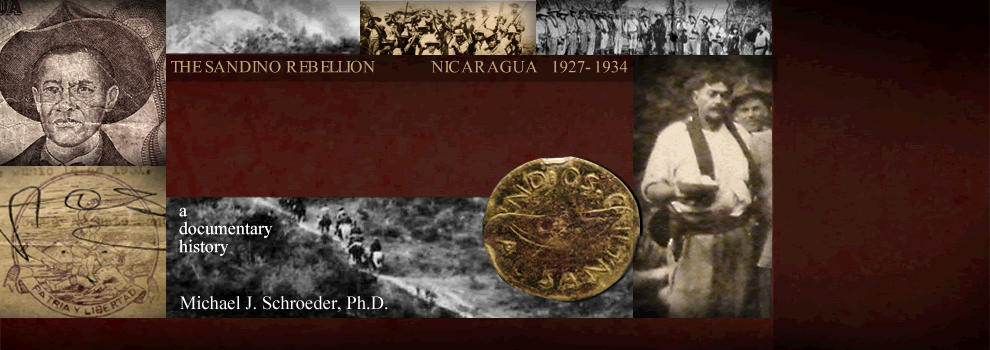| |
|
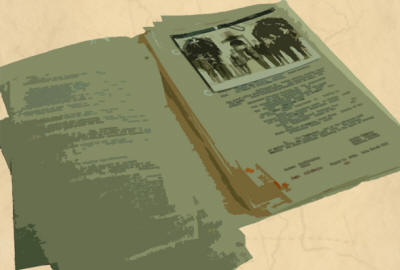 Page
10
of Fat File on Sandino Situation,
US Military Intelligence Division, 1928-33 Page
10
of Fat File on Sandino Situation,
US Military Intelligence Division, 1928-33
Documents are presented
here in their original sequence as found in three bulging file folders
titled "Sandino Situation,"
Record Group 165, Entry 77, Box
2653, US National Archives II,
College Park MD.
Grateful appreciation is extended to Mr. Brandon Ray,
Summa Cum Laude college graduate from
Ashford University in Iowa (with a B.A. in
History and a minor in Political Science) for
his exacting transcriptions on this page and the
previous nine pages. Thank you Brandon!
|
|
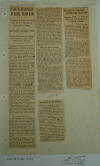
|
1. December 1932.
Press clippings. "25 Die
in Nicaragua in Rebel Train
Raid,"
New York Times,
28 Dec. 1932. "Nicaragua
Honors Americans in Guard —
Promotes Puller to Rank of Major
and Lee to Captaincy for Defeat
of Rebels,"
New York Times,
Dec. 29, 1932. "Moncada
Fetes Sacasa,"
New York
Times, Dec. 29, 1932.
"25 DIE IN NICARAGUA IN
REBEL TRAIN RAID ¶ 70 Guards,
Led by Americans, Rout Band of
250, Saving Captured Rail Crews.
¶ AIR CORPS ORDERED HOME ¶
Marine Fliers Leave for
Quantico, Va., Jan. 1 and 2
After Four Years’ Service.
¶ By Tropical Radio to
THE NEW YORK TIMES. ¶ MANAGUA,
Nicaragua, Dec. 27.—A detachment
of seventy Nicaraguan National
Guardsmen, officered by eight
United States Marines, drove off
with heavy casualties an
insurgent band which attacked a
troop train near Santa Lucia
yesterday. The crews of two work
trains, on the point of being
executed by their rebel captors,
were rescued. ¶ In an hour’s
heavy fighting, twenty-two
rebels and three National
Guardsmen were killed and three
Guardsmen were wounded. The
number of insurgent wounded is
reported to have been large. ¶
The Guard detachment had been
dispatched over the new railroad
from Leon to El Sauce to clear
the surrounding country of
guerrila [guerrilla] bands in
preparation for the formal
opening of the line by President
Moncada at the end of this
month. The train was halted near
Santa Lucia by irregulars led by
the chieftains Umanzor and
Benavides. ¶ The Guardsmen went
immediately into action,
directed by their commander,
First Lieutenant Lewis B.
Puller, U. S. M. C., a Virginian
and holder of the Navy Cross.
His aides were National Guard
Lieutenants Lee, Stevens,
Snyder, Bunn, Pulver, Hays and
Lynch, all marines who have won
their spurs in the fighting with
Nicaraguan insurgents in the
past four and one-half years. ¶
The Guardsmen captured fifty-two
pack animals and a quantity of
rifles, ammunition and supplies.
¶ While the fighting was going
on at Santa Lucia, a National
Guard patrol led by native
officers drove off another rebel
group which was harassing work
on the railway near El Sauce. ¶
Marine Fliers Ordered
Home. ¶ WASHINGTON,
Dec. 27.—Twenty-two Marine Corps
airplanes with as many flying
officers, accompanied by
thirty-nine enlisted men who
have helped write a brilliant
chapter of air accomplishments
during the last four and
one-half years, were ordered
today to evacuate Nicaragua on
Jan. 1 and 2, in compliance with
plans to withdraw all marine
forces from that country as soon
as practicable at the end of the
current year. ¶ Five amphibian
planes were routed via Belize,
British Honduras, Havana, and
Miami to Quantico, Va., a total
flying distance of 2,482.5
miles, much of it over water.
The observation and transport
planes of the Aircraft Squadrons
attached to the Second Marine
Brigade will fly by way of
Mexico, Texas, New Orleans and
on up the Atlantic Coast. The
itinerary of the last two
squadrons calls for 3,059 miles
between Managua, Nicaragua, and
Quantico. Established air lines
of the Pan-American Airways will
be followed by all three
flights, and provisions for
refueling and overnight stops en
route have been arranged. ¶
While the mass movement of the
marine planes is one of the most
ambitious ever undertaken by the
famed “Leathernecks,” it is in
keeping with the outstanding
achievements recorded by the
aviators since they arrived in
Nicaragua on March 1, 1927. A
survey of these remarkable
flights reveals almost every
kind of heroism. The
Distinguished Flying Cross has
been awarded frequently, but
many spectacular pilots have
never received decorations
because the hazards at first
encountered soon became
“ordinary” to the aviators. ¶
Daring Air Raid on
Sandino. ¶ One of the
first tales of daring came from
Nicaragua in July, 1927, soon
after the marine fliers were
sent into action. Two planes
were fired upon when they
discovered the insurgent General
Augusto C. Sandino and his band.
They returned to their base and
led a flight of five planes,
heavily loaded with bombs and
machine-gun ammunition, back
over the rebel camp and with
sweeping and diving attacks
piled up a casualty list finally
estimated at more than 300. ¶
Secretary of the Navy Adams
twice wrote letters commending
the entire marine aviation
personnel on duty with the
Second Brigade. ¶ Two flying
crews were temporarily “lost,”
one fighting its way out from
the jungles in two days, while
the crew of the other plane,
guided by flying companions,
required ten days to reach the
outside of the jungles. Terrible
suffering on each occasion was
revealed in letters of
commendation to the crews. Two
marine fliers were killed during
the search for one of the lost
crews. ¶ Marine files bulge with
records of bravery and
hardships, but officials today
merely commented: “It will be
nice for those fellows to reach
their base at Quantico again;
they’ve been away so long the
United States will look
strange.” ¶ MONCADA
FETES SACASA. ¶ Nicaraguan
President Holds a Reception for
Successor. ¶ Wireless
to THE NEW YORK TIMES. ¶
MANAGUA, Dec. 29.—A large
reception was held by President
Moncada in the Presidential
Palace last night in honor of
President-elect Sacasa and his
family. ¶ Tomorrow the President
will open the railroad
connecting Leon and El Sauce.
Among those invited to attend
the ceremonies is Brig. Gen.
Randolph C. Berkeley of the
United States Marine Corps. ¶
The rebels are reported to have
brought up reinforcements with
the intention of interfering
with the ceremonies. The
National Guard is prepared for
eventualities. The local press
says Sandino has proposed as one
essential of peace that his army
become the official army of
Nicaragua. ¶ NICARAGUA
HONORS AMERICANS IN GUARD ¶
Promotes Puller to Rank of Major
and Lee to Captaincy for Defeat
of Rebels. ¶ By
Tropical Radio to THE NEW YORK
TIMES. ¶ MANAGUA, Nicaragua,
Dec. 28.—It is reliably reported
that the rebel chieftain
Benavides was killed and his
co-leader Umazon [Umanzor] was
wounded in the fight with
National Guardsmen whose train
the rebels ambushed near Santa
Lucia Monday afternoon. The
bodies of twenty-five rebels
were left on the scene of the
clash. ¶ President Moncada today
promoted Lieutenant Lewis B.
Puller, U. S. M. C., to the rank
of Major and Gunnery Sergeant
William A. Lee to the rank of
Captain in the Nicaraguan
National Guard. ¶ An American
veteran of the War with Spain
and the World War, whose name is
given as Hill, and a German
named Crennel were among the
trainmen rescued by the Guard
detachment as the insurgents
were on the point of executing
them Monday. ¶ Special
to THE NEW YORK TIMES.
¶ WASHINGTON, Dec. 28.—The Navy
Department today gave out the
following list of members of the
United States Marine Corps who
participated in Monday’s clash
with Nicaraguan insurgents near
Santa Lucia. ¶ First Lieutenant
Lewis B. Puller of West Point,
Va.; Gunnery Sergeant William A.
Lee of Haverhill, Mass.;
Sergeant W. W. Stevens of
Eudora, Ark.; Corporal Cecil D.
Snyder of Lockhart, Tex.;
Corporal B. M. Dunn of Chicago;
Gunnery Sergeant William F.
Pulver of Burlington, Wash.;
Corporal Virgil Hays of
Inglewood, Cal.; and
Pharmacist’s Mate Thomas M.
Lynch of Winston Salem, N. C.
Lieutenant Puller was a Captain
and the others were Lieutenants
in the Nicaraguan National
Guard."
|
|
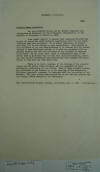
|
2. January 1, 1933.
G-2 Intelligence
Report, "Probable Enemy
Intentions," Hq. 2nd Brigade,
Managua.
"NICARAGUA – Political. ¶ 3020 ¶
Probable Enemy Intentions. ¶ Dr.
Juan Bautista Sacasa and Dr.
Rodolfo Espinosa were
inaugurated as President and
Vice President, respectively, of
the Republic of Nicaragua on
January 1, 1933. ¶ From latest
reports it appears that
organized banditry has ceased
all operations until indirect
negotiations with the new
administration have been
attempted. It is almost
impossible to predict just what
will be the outcome of such
negotiations. From sources in
the confidence of the new
administration it is learned
that Dr. Sacasa intends to have
absolutely nothing to do with
any agreement with organized
banditry and will use all means
at his disposal to suppress it
by force. On the other hand,
there is considerable talk to
the effect that an agreement
will be made with organized
banditry, granting them various
concessions and guaranteeing
them freedom from molestation if
they will lay down their arms. ¶
There is no doubt, however, of
the feeling of the property
owners and the better class
citizens, who are outspoken in
their pessimistic predictions
for the future. Many of them
actually doubted the withdrawal
of the Marines up to the very
day of the evacuation. The
press, generally speaking, is
overjoyed with the evacuation of
the Marines. The lower classes
and persons who do not own any
property are also highly elated
because of the evacuation. ¶
(Hq. Second Marine Brigade,
Managua, Nicaragua, Jan. 1, 1933
– Confidential.)"
|
|
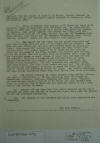
|
3. December 31, 1932.
Extracts from the report of
Major L. B. Puller, Guardia
Nacional de Nicaragua to the
Jefe Director, Guardia Nacional.
"Extracts from the report of
Major L. B. Puller, Guardia
Nacional de Nicaragua to the
Jefe Director, Guardia Nacional
De Nicaragua, dated 31 December,
1932. ¶ 1. While proceeding from
Managua to El Sauce via train on
26 December, 1932, in accordance
with reference (a), the train
was ambushed at 1600 near Punta
Rieles by a bandit group under
the command of Umanzor. This
group numbered two hundred and
fifty (250) men and were armed
with one (1) Lewis Machine Gun,
two (2) Browning Automatic
Rifles, four (4) to six (6)
Thompson Sub-Machine Guns,
rifles, pistols, dynamite bombs,
and well supplied with
ammunition. ¶ 3. The ambush was
ill timed and the patrol
detrained and went into action,
with the loss of one killed and
one wounded. Two more men were
killed and two more were wounded
later on during the fight.
Thirty-one (31) bandits were
killed and their bodies left on
the field. The patrol remained
in El Sauce and the vicinity
until the afternoon of the 30th.
December and reports were
brought in to the effect that
the bandits have not reformed
their group but are traveling
north in small groups of about
five and many of them are
wounded. Positive information
was received that the Jefes
Umanzor and Morales were wounded
and were carried off about the
middle of the engagement. The
Jefe Benavides and Umanzor’s
adjutant were killed. The fire
fight lasted one hour and five
minutes. The patrol was
handicapped by having to guard
the train and a shipment of
rifles and ammunition during the
fight. The bandits scattered and
fled in all directions after
they were driven from their
positions. ¶ 4. The patrol
captured 63 riding animals with
saddles, bridles and pads, 8
Krag rifles, 1 38 cal. revolver,
over 700 rounds of ammunition,
blankets, clothing, hammocks and
other loot. Reliable information
was received that 15 to 20
rifles and many pistols were
found by dearches from El Sauce
who hid them and failed to turn
them over to the Guardia
Nacional. ¶ 9. Umanzor did not
know that the patrol numbered 64
men and 8 officers and only sent
100 men to begin the fight; in a
very few minutes he put his
remaining 150 men in. ¶ 10. The
conduct of the officers and men
in this engagement was
exemplary. ¶ /s/ L.B. Puller."
|
|
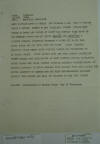
|
4. December 27,
1932. Telegram from
NICELECT to OPNAV re "Captain
Lewis B. Puller, Lts. William A.
Lee, Ward W. Stevens, Cecil D.
Snyder, Bennie M. Bun, William
F. Pulver, Virgil Hays, Thomas
M. Lynch & a patrol of 60 had
contact with group of 250
bandits jefes Umanzor &
Benavides".
"FROM: NICELECT ¶ ACTION: OPNAV
¶ INFO: MARCORPS COMSPERON ¶
8627 CAPTAIN LEWIS B PULLAR
[PULLER] LTS WILLIAM A LEE WARD
W STEVENS CECIL D SNYDER BENNIE
M BUN [BUNN] WILLIAM F PULVER
VIRGIL HAYS THOMAS M LYNCH AND
PATROL OF SIXTY HAD CONTACT WITH
GROUP OF TWO HUNDRED FIFTY
BANDITS JEFES UMANZOR AND
BENAVIDES W SIXTEEN HUNDRED
TWENTYSIX DECEMBER W POINT OFF
RAILS NEAR SANTA LUCIA ONE SIX
NINE DASH TWO EIGHT EIGHT
BANDITS AMBUSHED TRAIN UNDER
WHICH GUARDIA PATROL WAS
PROCEEDING TO EL SAUCE PERIOD
FIGHT LASTED OVER ONE HOUR
BANDIT CASUALTIES TWENTY KILLED
AND INDICATIONS OF MANY WOUNDED
GUARDIA CASUALTIES THREE KILLED
AND THREE WOUNDED SEVERAL
RAILROAD WORKMEN KILLED BY
BANDITS CAPTURED FIFTYTWO
ANIMALS WITH SADDLES FOUR KRAG
RIFLES ONE PISTOL QUANTITY OF
AMMUNITION AND MANY
MISCELLANEOUS ARTICLES BANDITS
WERE ROUTED AND FLED IN DISROUTE
TO THE WEST PERIOD ¶ 169-288 ¶
Coordinates to Marine Corps ¶
Map of Nicaragua."
|
|
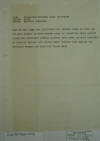
|
5. December 28,
1932. Telegram from
Nicaraguan National Guard
Detachment.
"FROM
NICARAGUAN NATIONAL GUARD
DETACHMENT ¶ ACTION OPNAV ¶
INFORM: MARCORPS COMSPERON ¶
8628 MY 8627 1030 FIVE
ADDITIONAL DEAD BANDITS FOUND ON
FIELD AND SIX MORE ANIMALS
CAPTURED MAKING TOTAL OF
TWENTYFIVE KNOWN BANDITS KILLED
AND FIFTYEIGHT ANIMALS CAPTURED
PLUS OTHER ARTICLES MENTIONED IN
PREVIOUS MESSAGE VERY STRONG
RUMORS CURRENT THAT UMANZOR WAS
SERIOUSLY WOUNDED AND BENAVIDES
KILLED 0830"
|
|
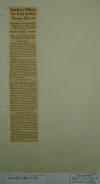
|
6. December 25,
1932. Press clipping: "Sandino Offers To
End Strife, Sacasa Hears," U.P.
"Sandino Offers To End
Strife, Sacasa Hears ¶
Nicaraguan Insurrectionist
Reported to Have Submitted Peace
Proposal ¶ Would Reform Treaties
¶ Asks National Convention Be
Called to Ratify Plan ¶
By The United Press ¶ MANAGUA,
Nicaragua, Dec. 24—Are the two
former companion revolutionists,
President-elect Juan B. Sacasa
and General Augustino C.
Sandino, about to declare peace
and end the insurrectionist
turmoil that has kept Nicaragua
in an uproar for five years and
cost the lives of scores of
United States marines and
hundreds of Nicaraguans? ¶
Conflicting reports of tentative
negotiations between
representatives of General
Sandino, famed insurrectionist,
and President-elect Sacasa were
circulated here this week.
General Horacio Portocarrera
[Portocarrero], one of Sandino’s
men, was reported from Mexico
City to have begun negotiations
with Dr. Sacasa for a Christmas
truce that might be extended
indefinitely providing General
Sandino is given a post in the
new government. ¶
Outlines Peace Terms ¶
On the other hand, Dr. Pedro
Zepeda, General Sandino’s
foreign representative, who is
also stationed at Mexico City,
declared that his chief would
agree to peace only if Dr.
Sacasa would (1) reject foreign
intervention in Nicaraguan
interior affairs, including
customs, railroads and banks;
(2) reorganize the Guardia
Nacional with all officers to be
native Nicaraguans; (3) convoke
a constitutional convention to
make political and social
reforms and (4) convoke a
national convention for the
purpose of reforming or
denouncing all treaties since
1915 and also permitting the
Sandinistas to continue as an
organized army until the terms
of peace are carried out. ¶
Fought Side by Side
¶ Dr. Sacasa, who himself has
held the rank of general in
revolutionary uprisings, has
indicated that he will force a
quick termination to guerilla
warfare in northern Nicaragua by
peaceful or warlike means when
he assumes office January 1,
1933. Withdrawal of United
States marines stationed here on
January 2 will leave Nicaragua
without foreign armed forces for
the first time in many years. ¶
General Sandino fought side by
side with Dr. Sacasa, then a
general, in the revolt against
General Emiliano Chamorro, which
ended with the peace treaty of
Tipitapa."
|
|
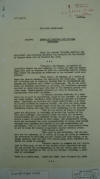
|
7. December 16,
1932. G-2 Translation of
"Sandino, Honduras and
Nicaragua," editorial in La
Noticia, Managua, Nov. 29,
1932, Alex A. Cohen, for & in
the absence of the Military
Attaché, Costa Rica, p. 1.
"G-2 Report. ¶ 3,850-a. ¶
NICARAGUA (Political) ¶ Subject:
Status of Relations with Foreign
Countries. ¶ Under the caption
“SANDINO, HONDURAS AND
NICARAGUA”, the following
editorial was published in “La
Noticia” of Managua under date
of November 29, 1932. ¶
“Colindres and Umanzor,
commanders of Sandinista forces
who were menacing the cities of
León and Chinandega, have gone
to Honduras to join the
revolution against Carías. This
notice was furnished us
yesterday by the national radio
news service. ¶ “This report, if
ocrrect [correct], is a source
of alarm for Central America,
and especially for Nicaragua.
Should the revolution win in
Honduras, Sandino will be
strengthened and Umanzor and
Colindres will return to
Nicaragua. If, on the other
hand, the Honduras revolution is
defeated, the Sandinista
commanders will re enter
Nicaragua with many of the
defeated people with their arms.
Should anarchy commence to reign
in Honduras, the consequences
will still be worse. ¶ “A
Central American outbreak, of a
size which can not yet be
appreciated, might be the
outcome. El Salvador backs
Carías. Rivalries exist between
El Salvador and Guatemala.
Nicaragua, by no means can
remain indifferent, as it will
be as much affected as Honduras
itself. The fire now being
kindled in our sister republic
might break out not only with
its own smoldering flames, but
also with those smoldering in
the Segovias. ¶ “This is the
moment in which we Nicaraguans
are obligated, by instinct, to
accept the reality of the very
grave problem. The Liberal
Party, on which the immediate
responsibility for the situation
falls, can not pass it up, but
should prepare to confront it
with valor. The Conservative
Party, which has contracted the
grave responsibility of peace,
also should consider this
question for reasons of its own
conservation and patriotism.
This is the first occasion that
the Conservative Party is put on
trial for sincere cooperation
towards national peace. ¶ “What
should we do? ¶ “The reply is
not difficult. Let us prepare
for the upheaval, if it comes,
so it may not catch us unawares.
The Government of Nicaragua can
not remain with four rifles, so
to speak, awaiging [awaiting]
what may come with folded arms,
while agitators are sowing the
seeds of anarchy. ¶ “Central
America is menaced and the
Government of Nicaragua, as one
of the parties first interested
to ward off and prevent the
conflagration, is the one called
upon to initiate in its internal
as well as in its foreign
relations, a movement of
salvation.” ¶ From: M. A. Costa
Rica ¶ Report No. 1880 ¶ Date:
December 16, 1932. . . . "
|
|
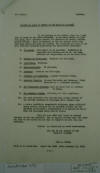
|
8. December 16,
1932. G-2 Translation of
"Sandino, Honduras and
Nicaragua," editorial in La
Noticia, Managua, Nov. 29,
1932, Alex A. Cohen, for & in
the absence of the Military
Attaché, Costa Rica, p. 2.
" . . . G-2 Report. ¶ 3,850-a. ¶
COMMENT ON ABOVE BY OFFICE OF
THE MILITARY ATTACHÉ. ¶ In the
opinion of the writer, there is
a good deal of truth in the
above editorial. At no time,
during the past ten years, have
relations between the republics
of Central America passed
through a stage as critical as
the one through which they will
pass during the next few months.
The following are some of the
more important problems
confronting the Governments
concerned: ¶ 1. Communism.
Principally in El Salvador.
Smoldering in Guatemala and
Honduras and on the increase,
although not dangerously as yet
in Costa Rica. ¶ 2. Changes in
Government. Honduras and
Nicaragua. ¶ 3. Revolution.
Honduras. ¶ 4. Non-recognition.
El Salvador. ¶ 5. Banditry.
Honduras and Nicaragua. ¶ 6.
Jealousy and Suspicion. Against
President Ubico. ¶ 7. Boundary
Dispute. Between Guatemala and
Honduras. Final decision to be
announced shortly. ¶ 8. The
Washington Treaties. Move by
Costa Rica to denounce Treaties.
¶ 9. The Economic Crisis.
Affecting all five republics. ¶
10. The idea prevalent that
Moncada will retain control of
the Guardia Nacional de
Nicaragua after January 1st. ¶
11. A rather indefinite
sympathetic alignment along
political lines between Honduras
and El Salvador (Carías and the
Martínez Government) –
Conservative – as opposed to
Guatemala and Nicaragua along
Liberal lines. ¶ What the year
1933 will bring to Central
America, no one can foretell.
But it appears certain that the
guiding hand of the United
States will be required on more
than one occasion. ¶ Source: As
stated and personal observation.
¶ FOR AND IN THE ABSENCE OF THE
MILITARY ATTACHE: ¶ Alex A.
Cohen. ¶ From: M. A. Costa Rica
¶ Report No. 1880 ¶ Date:
December 16, 1932."
|
|
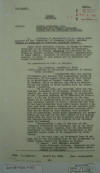
|
9. December 16,
1932. G-2 Translation of
article in Excelsior,
Mexico City, December 12, 1932,
"Mexico Is Asked Not To
Recognize President Sacasa,"
Capt. Robert E. Cummings, Acting
Military Attaché, Mexico City, p. 1.
"G-2
Report ¶ 3850-a ¶ MEXICO ¶
POLITICAL ¶ SUBJECT: Foreign
Relations, Etc. ¶ Relations with
Foreign Countries: ¶ SANDINO and
the Nicaraguan Situation. ¶ 1.
Following is translation of an
article which appeared in the
“Excelsior” of December 12,
1932, entitled “Mexico is asked
not to recognize President
Sacasa”. ¶ Señor David Rodriguez
Galiano, in charge of Foreign
Relations of the provisional
Government of Nicaragua,
presided over by General
Colindres and sustained by the
forces of General Sandino, has
addressed a communication to
Señor Téllez, Secretary of
Foreign Relations of our
country, in which he asks Mexico
not to recognize the Sacasa
Government. ¶ The communication
reads as follows: ¶ “Las
Segovias, December 3, 1932. ¶
“Señor Ministro de Relaciones
Exteriores de Mexico, ¶ “Señor
Ministro: ¶ “Information from
the Capital of Honduras has
reached this mountainous region
of Nicaragua, of the report
given out in that Capital by an
ex-officer of General Sanino’s
army, José de Parédes, which is
untrue, and which is explicable
by the manner in which Parédes
left the ranks,- almost a
deserter. ¶ It is not true, Mr.
Minister, that the Provisional
Government of Nicaragua,
presided over by General don
Juan Gregorio Colindres, by
appointment of the ‘Ejercito
Defensor de la Soberanía de
Nicaragua’, is in any difficulty
whatever; on the contrary, it is
consolidating in the opinion of
Nicaragua, although timidly at
first,- especially now that it
has been discovered that Señor
Sacasa signed a secret pact with
Admiral Woodward of the American
Navy, by which he promised to
re-establish American officers
in the Guard of this country,
with manifest lack of
patriotism, which makes
impossible all recognition on
the part of the free forces of
the nation, aside from the fact
of the elections carried out by
the foreign marines in the
section of the Republic under
his control. ¶ “Consequently I
ask, in the name of the
‘Gobierno Libertador de
Nicaragua’ and of the Chief of
the Army, General Sandino, that
the illustrious Government of
Mexico refuse its recognition to
the spurious regime about to be
inaugurated by Señor Sacasa. ¶
“At the same time, my Government
begs to remind you of the
well-known case of the
disloyalty of Señor Sacasa
toward the Republic of Mexico. ¶
“I remain, Your obedient
servant, ¶ “David Rodriguez
Galiano, Encargado de las
“Relaciones Exteriores del
Gobierno Provisional de
Nicaragua.” ¶ From: M.A.Mexico.
¶ Report No. 4313. ¶ Date: Dec.
16, 1932. . . . "
|
|
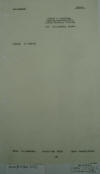
|
10. December 16,
1932. G-2 Translation of
article in Excelsior,
Mexico City, December 12, 1932,
"Mexico Is Asked Not To
Recognize President Sacasa,"
Capt. Robert E. Cummings, Acting
Military Attaché, Mexico City, p. 2.
"
. . . G-2 Report ¶ 3850-a ¶
Robert E. Cummings, ¶ Captain,
Infantry (DOL) ¶ Acting Military
Attaché. ¶ Per: M.B.Pattin,
Clerk. ¶ Source: As stated. ¶
From: M.A.Mexico. ¶ Report No.
4313. ¶ Date: Dec. 16, 1932."
|
|
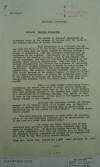
|
11.
December 15, 1932. G-2
Report on Current Situation,
Alex A. Cohen, Military Attaché,
Costa Rica, p. 1.
"G-2 Report ¶ NICARAGUA
(Political) ¶ Subject: Current
Situation. ¶ The matter of
greatest importance in Nicaragua
today is the process of turning
over the posts in the Guardia
Nacional to native officers. ¶
This procedure is a different
one at any time but to do it in
the field, during active
operations, and at a time when
the whole country is passing
through a change of government,
with its attendant difficulties,
is hazardous in the extreme.
Practically all of the higher
offices in the Guardia are being
given to politicians and men of
influence, who have not received
any training in the Guardia
under American supervision. Just
how long a well-trained
organization can survive the
influence of untrained or
partially trained commanding
officers is not a matter of
conjecture. Disentegration
[Disintegration] and
inefficiency will set in
immediately. The younger
“American trained” officers,
will soon become jealous of the
higher ranking officers of
little or no combat experience.
In short, the wonderful work
done by the Marines in training
the Guardia, in which duty about
twenty-five American lives were
sacrificed, will soon be wasted.
¶ There are many rumors
circulating about, concerning
the secret pact said to exist
between Ubico and Moncada. These
rumors claim that at the last
minute Moncada will take
personal command of the Guardia
and, under pretext of a
revolution or of fighting
Sandino, will refuse to turn it
over to his successor. At the
head of the Guardia he can
regain control of the country. ¶
Although the Americans retain
(in theory) command of the
Guardia until it is turned over
to President Sacasa on January
1st,--in practice this
practically impossible due to
the nature of their orders. In
effect these orders stated: ¶
“You will evacuate Nicaragua as
soon after the inauguration of
the new President (January 1st)
as practicable, but in any case
not later than January 2nd.” ¶
To carry out these orders most
of the Americans must actually
turn over their commands many
days prior to January 1st. If
anything breaks between the time
the lower commanders turn over
and January 1st, it will find
the American Guardia commander
in command of an organization
over which he has very little
actual control. ¶ From: M.A.
Costa Rica ¶ Report No: 1,869 ¶
Date: December 15, 1932. . . . "
|
|
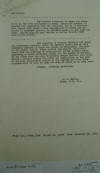
|
12.
December 15, 1932. G-2
Report on Current Situation,
Alex A. Cohen, Military Attaché,
Costa Rica, p. 2.
"
. . . G-2 Report. ¶ The Sandino
situation is vague and seems to
be as far from settlement as
ever. President Moncada is
against any compromise with the
“bandit”, but it is believed
that Sacasa will adopt a more
conciliatory attitude and
endeavor to pursuade [persuade]
Sandino, by peaceful means, to
lay down his arms. Rumors
persist that Sandino is having
trouble with some of his chiefs.
¶ The question of trouble
breaking out among the different
factions, after the Marines
leave, has as many different
answers as there are people in
Nicaragua. The mass of the
people seem to think trouble
inevitable. This will start when
the hundreds of disappointed
office seekers begin clamoring
to their different chiefs for
the spoils of victory. On the
other hand the more thoughtful
people believe that there exists
a sincere desire for peace and
tranquility on the part of the
more responsible people in the
country and that these citizens
will be able to keep the ship of
state on an even keel. ¶ Source:
Personal knowledge. ¶ A. R.
Harris, ¶ Major, G.S., M.A. ¶
From: M.A. Costa Rica ¶ Report
No: 1,869 ¶ Date: December 15,
1932."
|
|
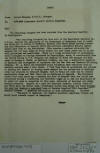
|
13. December 11, 1932.
Telegram from American Legation,
Tegucigalpa, to 2nd Brigade
USMC, Managua, to COMSPERON.
"(COPY)
¶ From: Second Brigade,
U.S.M.C., Managua. ¶ To:
COMSPERON (Commander Special
Service Squadron). ¶ 0012 ¶ The
following telegram has been
received from the American
Legation in Tegucigalpa: ¶ “The
following telegram has been sent
to the Department December 11, 4
P.M.: Despite the assurances of
the Government of Guatemala that
it would not allow him to return
to Honduras, General Jose Maria
Reina arrived yesterday from
Chaaperico at Amapala where the
military commandant General
Andres Garcia went over to the
Revolution. This creates a
serious situation for Amapala
has not been taken by force
within the past sixty years and
it is now well garrisoned
munitioned. There is a large
accumulation of merchandise
there cosigned to foreign
merchants in Tegucigalpa, among
it considerable from the United
States to P.A. Glougher and
Company of which the manager and
part owner is George A. Hadie,
an American citizen, and also a
substantial quantity of dynamite
and consignment of equipment for
the New York and Honduras RO
Mining Company. Mr. A. Hadie and
President Majia Colindres have
requested that an American
warship make a call there. I
told them that my government was
opposed to sending war vessels
to foreign ports except for the
protection of American lives and
property in imminent danger;
that it would not send one to
protect merchandise alone and
that there are no Americans at
Amapala. The President stated
that some years ago a warship
was sent to Amapala when the
island was threatened during a
revolution and therefore urged
me to ask the Department if it
would not make an exception in
this case, interests of American
and other foreign property.
Amapala is a port for American
vessels, notably those of the
Grace Line and Dollar Line.
President states that Reina has
asked Sandino for arms but
Sandino’s secretary here at
Mexican Legation told President
Sandino refused. I question
reliability of this information.
(Pafion) ¶ “Repeated to Comperon
[Comsperon], all Central
American legations, Panama and
North Coast consuls repeat to
Comsperon."
|
|
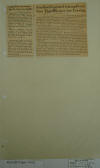
|
14. December 1932.
Press clippings: "Sandino
Drives Out Insurgent Who Set Up
His Own Republic," New York
Times (Dec 8); "Sandino Reported Asking Peace
Now That Marines Are Leaving,"
New York Tribune
(Dec
21).
"Sandino
Drives Out Insurgent Who Set Up
His Own Republic ¶
Special Cable to THE NEW YORK
TIMES. ¶ MANAGUA, Nicaragua,
Dec. 7.—The rebel leader Juan
Gregorio Colindres has been
attacked and defeated by
insurgent troops under Augusto
Sandino, according to reliable
reports received here today.
Colindres recently set up a
“republic” in Segovias, Northern
Nicaragua, with himself as
“President.” ¶ Hitherto
Colindres had cooperated with
Sandino. He is reported to have
escaped after the battle with
the latter and to have fled to
Honduras, of which country he is
a native. ¶ Colindres has been
in active rebellion in Nicaragua
for months. In July he and
another rebel chieftain led an
attack on a small patrol of
Nicaraguan guardsmen, killing
one and wounding three. Last
month a state of siege was
declared in the Departments of
Leon and Chinandega on account
of his activities. ¶
Sandino Reported Asking Peace
Now That Marines Are Leaving
¶ By The United Press ¶ MEXICO
CITY, Dec. 20.—Tentative
negotiations for the surrender
of General Agustino Sandino,
Nicaraguan rebel leader, have
been begun by agents for
Sandino, reliable Nicaraguan
sources said here today. ¶ It
was proposed that Sandino
abandon his armed campaign soon
after Dr. Juan B. Sacasa’s
inauguration as President of
Nicaragua on January 1, if
reasonable terms could be
arranged. The offer was
submitted to Dr. Sacasa through
General Portocarrero, whom
Sandino last summer named
“provisional president” of
Nicaragua, the reports said. ¶
Although Sandino has said he
would never recognize an
administration voted into office
“under the guns of the United
States marines,” it was believed
that withdrawal of the marines
would enable Sandino to
represent his surrender as a
victory. He had sworn to fight
until the last “invader” had
left Nicaraguan soil, and the
marines are leaving now.
Evacuation is expected to be
complete by January 2. ¶ If
terms are arranged, it is
assumed that a government
position would be offered to
Sandino, and his followers would
receive amnesty. Dr. Sacasa is
understood here to be determined
to end the civil war either by
negotiation or force after
taking office. ¶ Marines
in Nicaragua Since 1926
¶ The American marines returned
to Nicaragua in 1926, after
revolutionary disturbances and
have dominated the country
since. In 1927 Henry L. Stimson,
as person representative of
President Coolidge, induced all
factions except that of Sandino
to lay down their arms and agree
to abide by the results of an
American-supervised election.
Sandino and his ultra-patriotic
followers have fought
intermittently against the
marines and the Nicaraguan
Guardia Nacional, chiefly in the
mountainous north."
|
|
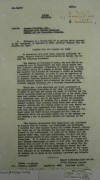
|
15. December 6,
1932. G-2
Translation of article in
Excelsior, Mexico City,
"Sandino Will Not Abandon the
Fight" (Dec 3), Capt. Robert E.
Cummings, Acting Military
Attaché, Mexico City.
"G-2
Report ¶ 3850-a ¶ MEXICO ¶
POLITICAL ¶ SUBJECT: Foreign
Relations, etc. ¶ Relations with
Foreign Countries: ¶ SANDINO and
the Nicaraguan Situation. ¶ 1.
Following is a translation of an
article which appeared in the
“Excelsior” of December 3, 1932,
entitled “Sandino Will Not
Abandon the Fight.” ¶ SANDINO
WILL NOT ABANDON THE FIGHT ¶ In
connection with news items
recently published, Dr. Zepeda,
General Sandino’s representative
in Mexico, has issued the
following statement: ¶ “The
enemies of Nicaragua’s cause,
who have let no opportunity pass
to misrepresent the high ideals
behind General Sandino’s
struggle, attempting to distort
what is only the sincere desire
of a people to govern
themselves, yesterday reported
the defender of Nicaragua’s
rights as heading a revolution
in Honduras, in order to stir up
questions of an internal nature;
and now they imagine him, not as
still in Honduras fighting
fantastic battles, but in the
Segovian forests busying himself
with disarming the brave and
invincible General Colindres for
a supposed insubordination. ¶
“Those who, first surprised and
later astonished at the
extraordinary discipline of our
army, the cruel tests to which
it has been put during six years
of fighting and the strict
selection which has been carried
out in our ranks,- they know
that neither General Juan
Gregorio Colindres is capable of
a censurable act, nor is any
member of the now glorious
organization capable of thinking
for a moment of abandoning
General Sandino, when everyone
knows there must exist
fundamental motives why the
supreme chief of our army should
refuse to enter into agreements
with those who, up to now have
only offered public posts and
sinecures, forgetting the basic
cause for which he has struggled
and will keep on struggling
while the so-called public men
of our country are not seeking a
way to guarantee liberty and
autonomy of the nation. ¶ “The
reports transmitted from
Tegucigalpa and attributed to
Captain José de Paredes, are
incongruous and untruthful. I
consider that they slander
Captain de Paredes himself,
because he, being one of the
officers who has most highly
distinguished himself on the
battlefields, it would not be
strnge [strange] that our
enemies would wish, with such
imputations, to stain the
brilliant service-record of this
sincere and loyal friend of our
fatherland. If it should be true
that Captain de Paredes did pass
through Tegucigalpa en route to
this city, the proper correction
will be made in due time,
because I am aware that the good
name and prestige of this young
officer demand that the truth be
told concerning the feeling and
thought of the “Ejercito
Defensor de la Soberania
Nacional de Nicaragua”, to which
he belongs and to which he has
rendered important and valuable
services.” ¶ Robert E. Cummings,
Capt. Inf. DOL ¶ Acting Military
Attaché. ¶ Source: As stated. ¶
C/p ¶ From: M.A. Mexico. ¶
Report No. 4293. ¶ Date: Dec. 6,
1932."
|
|
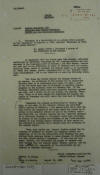
|
16. December 2,
1932. G-2 Translation of
article in Excelsior,
Mexico City, "Nicaragua is Still
Under Yankee Control" (Dec 1),
Capt. Robert E. Cummings, Acting
Military Attaché, Mexico City.
"G-2 Report ¶ 3850-a ¶ MEXICO ¶
POLITICAL ¶ SUBJECT: Foreign
Relations, etc. ¶ Relations with
Foreign Countries: ¶ SANDINO and
the Nicaraguan Situation. ¶ 1.
Following is a translation of an
article which appeared in the
“Excelsior” of December 1, 1932,
entitled “Nicaragua is Still
Under Yankee Control.” ¶ Dr.
Zepeda Issues a Statement á [à]
propos of the Withdrawal of 300
Marines. ¶ In connection with
the latest news from Managua,
published exclusively be [by]
EXCELSIOR, regarding the 300
American marines who have
embarked in the Nicaraguan port
of Corinto,- and that General
Sandino has sent part of his
effectives to fight in Honduras
with the revolutionaries there
(which is alarming the Managua
press),- we approached Dr. Pedro
José Zepeda, general
representative of the “Ejercito
Libertador Nicaragüense”, and in
our interview he made the
following statement: ¶ “For
those who follow closely the
unhappy events in my country,
the withdrawal of 300 marines
has no importance whatever when
it is remembered that these are
only a part of the 600 which
were sent to Nicaragua to
exercise greater pressure in the
electoral farce of November 6th.
Of the Military effectives which
have been directly fighting
against our army, not a single
one of the marines are leaving.
Therefore, there is no real
reason for rejoicing yet because
the people of Nicaragua are
still under the iron heel of
foreign domination. ¶ “Regarding
the alleged participation by
General Sandino, or our army, in
the internal affairs now
agitating public opinion in
Honduras, I can emphatically
state that the high ideals and
purposes of our cause would not
permit us to meddle in the
domestic affairs of any of the
Central American Republics; and
General Sandino and the
“Ejercito Defensor de la
Soberanía Nacional de Nicaragua”
would only intervene in defense
of the dignity and autonomy of
any Latin-American country in
case foreign powers attempted to
take action in the solution of
problems which concern only the
nationals of the country itself.
¶ “When, some months ago,
General Sandino warned the
Government of Honduras to
respect the boundary between our
countries, it was on the
supposition that Honduras was
permitting North American forces
to cross through its territory
and thus attack Sandino’s
rearguard. If this has not
happened, however, the
Government and people of
Honduras may rest assured that
our supreme chief, General
Sandino, and our Army, are and
will be, respectful of the
sovereignty and integrity of
Honduran territory.” ¶ Robert E.
Cummings, Capt. Inf. DOL ¶
Acting Military Attaché ¶
Source: As stated. ¶ C/p ¶ From:
M.A.Mexico. ¶ Report. No. 4286.
¶ Date: Dec. 2, 1932."
|
|
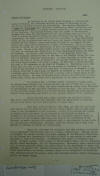
|
17. December 1, 1932.
Confidential G-2 Intelligence
Report on Sandino Situation,
U.S. Electoral Mission, Managua,
p. 1.
"NICARAGUA
Political. ¶ Sandino Situation.
¶ 3020 ¶ As outlined in the
report dated November 1,
covering the month of October,
the situation existing in parts
of Nicaragua on the eve of the
national election was
disquieting. The populous
Departments of Leon and
Chinandega were seriously
threatened by bandit activities,
and particularly by a state of
nervous tension prevailing
through all classes of the
populace. The Guardia Nacional
sent the cadets of the Military
Academy into these two
Departments and all available
men were put into the field on
active patrolling during the
week preceding election day. As
a consequence, the bandit groups
that had been operating in those
Departments moved out and
confidence was restored among
the people. Election day passed
quietly and the voting, though
measurably affected by the
recent disturbances, was, under
the circumstances, highly
satisfactory. Out of a
registration of 28,536 for the
Departments of Leon and
Chinandega, 23,801 votes were
cast. Though a few small bandit
groups have been reported from
time to time, no contacts have
taken place in these Departments
during the month of November. In
certain other Departments of the
Republic there were several
spasmodic demonstrations on the
part of the bandits during the
five days of November preceding
election day. In Nueva Segovia,
an attack was made on the town
of Jicaro on November 2 and
patrols operating in the field
had three light brushes with
bandit groups. In Jinotega, a
group attacked the town of La
Concordia on the night of
November 2. Scattering shots
were fired into the town of San
Rafael on the nights of November
3, 4 and 5. A patrol was
ambushed on the road from Yali
to Concordia on November 3, and
a patrol contacted a small group
at Biagual on November 3. On the
same day, a Guardia patrol from
Cabo Gracias had a contact with
a bandit group on the lower Coco
River. All were relatively minor
affairs but sufficient to
intimidate many voters and
prevent their appearance at the
polls on November 6. ¶ On
election day, a Guardia patrol
contacted a bandit group in
eastern Nueva Segovia and a
group entered the town of Yali
at 9 p.m., but were quickly
driven off without any known
casualties on either side.
Elsewhere no disturbances of any
note were reported on election
day. The active work of the
security forces before and on
election day effectively
prevented the bandits from
exercising any effect on the
general results of the election.
¶ Since election day, bandit
activity has declined notably.
Some minor skirmishes have been
reported from the Departments of
Jinotega and one from Esteli but
with small groups in every case.
¶ Just what position Sandino
will take, now that the
elections have passed and the
Liberals have won by a large
margin, has not been made clear
by an information so far
received. A copy of a
proclamation signed by Sandino
dated September 15 was secured
by the Guardia in Esteli on
November 7, in which he stated
that under no conditions would
he abide by the result of the
November elections, and that on
the withdrawal of the Marines,
he would continue his operations
until a new election is held
without any American
supervision. However, there are
recent indications that Sandino
is willing to modify his
pretentions. ¶ Since the
elections the sentiment that was
becoming noticeable for an
agreement with Sandino, has, in
a sense, crystallized. Managua
papers of November 19 carried
reports of a joint meeting of
the Executive Committees of the
Liberal and Conservative
factions at which it was agreed
to send commissions to treat
with Sandino. A commission was
named to represent each party:
Crisanto Sacasa, first cousin of
the President Elect, for the
Liberals, and Dr. David
Stadthagen, for the
Conservatives. Presumably these
commissioners will be given
definite powers and instructions
by the Government to treat with
Sandino. It appears that
informal discussions are now
under way as a basis for final
negotiations, as several
persons, known to be influential
in Sandinism, have recently
entered Nicaragua, among them
Fernando Larias, Manuel
Balladares, and Dr. Alejandro
Cerda. . . . "
|
|
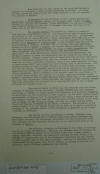
|
18. December 1, 1932.
Confidential G-2 Intelligence
Report on Sandino Situation,
U.S. Electoral Mission, Managua,
p. 2.
"
. . . Some publicity has been
gained by the so-called
University students in a
movement to send a peace
delegation to Sandino. An office
has been opened and
contributions are being
solicited to pay the expenses of
a mission to Sandino. ¶ On
November 22, the President
issued a decree placing the
Departments of Nueva Segovia,
Esteli, and Jinotega under a
state of siege. Reasons for this
are not apparent. These
Departments are reported as
being more tranquil during the
last half of November than they
have been at any other time in
the last two years. ¶ The
Guardia Nacional has entered the
period of transition from
American to Nicaraguan control.
The President has made 36
appointments of officers to fill
the higher ranks in the Guardia
Nacional. Thirty-three have been
sworn in during November. These
appointments were made from a
list of nominees proposed by the
President Elect, and are
supposed to be evenly divided
among Liberals and
Conservatives. A Jefe Director
with the rank of Major General,
6 Colonels, 8 Majors, and 21
Captains have been appointed.
General Anastacio Somoza, a
Liberal, and Colonel Gustavo
Abauanza, a Liberal, have been
designated as Jefe Director and
Chief of Staff respectively. The
newly designated Jefe Director
has already made assignments of
the new appointees. All staff
Departments, command of areas
and departments, and
second-in-command in areas and
departments will be filled by
the newly appointed officers.
Already a great deal of
dissatisfaction has been
manifested among the Nicaraguan
officers who have been through
the Academy and some of whom are
now being promoted to captains.
Some of the newly appointed
officers in Headquarters Staff
have entered on instructional
duty at Headquarters. The
initial attitude of some of
these officers is significant
and hardly augurs well for the
future. A tendency can be noted
toward impatience with American
administrative methods and a
lack of appreciation of orderly
and methodical office
management. Such a tendency is
not unusual under the conditions
-- of a civilian group taking
over control of a highly
organized military force.
However, impatience with an
administrative system which they
do not understand and which they
regard with little sympathy, may
easily provoke sweeping changes
that will jeopardize the
integrity of an organization
that is now a highly efficient
and capable force. ¶ Some
revolutionary activity has been
reported from the border
sections of Honduras during the
month. Several reports have been
received indicating a movement
of bandit groups from Nicaragua
into Honduras presumably to
participate in the revolution in
that country. As the month
closes, rumors are numerous in
Managua that the Sandinistas are
taking a very active part in the
Honduran trouble, that some 600
of them have occupied several
border towns such as Danli and
San Marcos de Colon, and that
the border country across from
Nueva Segovia is wholly in the
hands of Sandino. The situation
on the border country is at the
moment obscure and no data is at
hand to justify an estimate of
the probable effect of the
revolution in Honduras on the
bandit situation in Nicaragua. ¶
The Marine security detachments
in Rivas, Juigalpa, Leon,
Matagalpa, and Chinandega were
withdrawn immediately after
elections day. The Guardia
Nacional has discharged
practically all the auxiliaries
which were enlisted for the
electoral period and now is
essentially down to the strength
of June 1. ¶ The military
situation in Nicaragua at the
close of November is, on the
whole, satisfactory. Banditry
has declined very noticeably,
the two historic parties appear
to be on better terms than in
many years; a highly organized,
efficient and reasonably
adequate military force is in
process of being turned over to
the Nicaraguan Government and
the country is more peaceful
than it has been in months.
Banditry or Sandinism is not
extinguished by any means, but,
at the moment, it appears to be
more of a political than a
military problem for the
country. . . . "
|
|
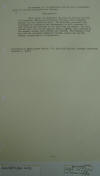
|
19. December 1, 1932.
Confidential G-2 Intelligence
Report on Sandino Situation,
U.S. Electoral Mission, Managua,
p. 3.
"
. . . On November 29, the
Secretaria Privada de la
Presidencia issued an official
declaration as follows: ¶
(Translation) ¶ “With grief, the
President has read the various
articles of literature, written
by Nicaraguan citizens, which
eulogize Sandino and his
lamentable work. The President
considers such literature as
subversive and consequently he
will prosecute if such writings
are repeated in the same form
and manner. The Government also
will proceed against Sandino
agents, who, shielded by the
amnesty decree, have entered the
country. The President does not
wish the so-called Communism for
his country nor the war between
classes which it represents.” ¶
(Confidential Intelligence
Report, U.S. Electoral Mission,
Managua, Nicaragua, December 1,
1932.)"
|
|
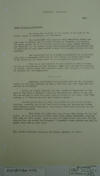
|
20. December 1,
1932. G-2 Intelligence
Report on Sandino Situation -
Enemy Suppy and Equipment, Hq.
Guardia Nacional, Managua.
"NICARAGUA
– Political. ¶ 3020 ¶ Enemy
Supply and Equipment. ¶ No
change has occurred in the
source of the bulk of the bandit
supply of ammunition, i.e.
Honduras. ¶ The bandits were
well supplied with ammunition
during the last week in October
and the first few days of
November, but expended the major
portion of it in contacts during
that time. Since election day
(November 6), the larger groups
have apparently been practically
out of ammunition as they have
avoided contact with guardia
patrols whenever possible. ¶ The
revolution now in progress in
Honduras has unquestionably made
it extremely difficult for the
bandits to obtain ammunition of
all types for the reason that it
is in demand for local use. ¶
Food is no real problem for the
bandits as they continue to live
on the country as they operate.
They also continue the practice
of forcing contributions from
property owners upon threats of
destruction of property for
non-compliance. ¶ Following
information was received from
one Dr. Alejandro Cerda, who has
been residing in Danli,
Honduras, for some time past and
who now is in Ocotal: ¶ There
are thirty thousand .45 cal.
rounds of ammunition at the port
of “La Union,” Salvador, that
the “Sandinistas” intend to buy
and who are waiting to have the
money ready in order to get
them. They were offered at 27
dollars for each one thousand
rounds. ¶ General Plata does not
help the bandits at all but he
remains inactive, possibly due
to the fact that he does not
receive any orders from
President Mejia Colindres. The
bandits have been tolerated by
the Honduran Government. ¶ They
enter and leave the city at any
time during the day and night.
It is in the city of Danli where
they supply themselves with all
they need at their camps. This
is also the place where they
sell all the animals that are
robbed in Nicaragua. Generally
these animals are sold by agents
they have in that city. ¶ (Hq.
Guardia Nacional, Managua,
Nicaragua, December 1, 1932.)"
|
|
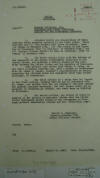
|
21. November 15,
1932. G-2 Translations of
local press: "The Yankees will
leave Nicaragua," La Prensa
(Nov 10), "The Policy in the
Republic of Nicaragua," El
Nacional (Nov 11), "General
Sandino intends to keep on
Fighting," La Prensa
(Nov 14), Capt. Robert E.
Cummings, Acting Military
Attaché, Mexico City, p. 1.
"G-2
Report ¶ 3850-a ¶ MEXICO ¶
POLITICAL ¶ SUBJECT: Foreign
Relations, etc. ¶ Relations with
Other Countries: ¶ SANDINO and
the Nicaraguan Situation. ¶ 1.
Attached hereto are translations
of three articles which recently
appeared in the local press.
These articles (1) “The Yankees
will leave Nicaragua”, from “La
Prensa[“] of November 10th. (2)
“The Policy in the Republic of
Nicaragua” from “El Nacional” of
November 11th.; and (3) “General
Sandino intends to keep on
Fighting”, from “La Prensa” of
November 14th. ¶ 2. The first
article deals with the triumph
of the Democrats in the recent
Presidential elections in the
United States, and predicts a
radical change in the relations
between the United States and
the Republic of Nicaragua. ¶
This article also states that
Newton D. Baker, on his visit to
Mexico sometime ago, held a
number of conferences with Dr.
Pedro J. Zepeda, Sandino’s
representative in Mexico,
regarding the attitude which the
Democrats would take toward
Nicaragua, if victorious. ¶ 3.
The third article is a reply
from Dr. Zepeda to the first
article, denying that he had an
interview with Mr. Baker, and
stating that his and Sandino’s
attitude towards the problem
remained unchanged, and that
Sacasa would not be accepted as
President, by Sandino, who would
keep on fighting in Nicaragua. ¶
4. The second article, the
writer of which is unknown as
the article is unsigned, states
that the United States
Government placed Sacasa in the
Government of Nicaragua, without
considering Sandino and his
“Liberating Army”. ¶ Robert E.
Cummings, ¶ Captain, Infantry
(DOL[)] ¶ Acting Military
Attaché. ¶ Source: Press. ¶ C/p
¶ From: M.A.Mexico. ¶ Report No.
4261. ¶ Date: Nov. 15, 1932. . .
. "
|
|
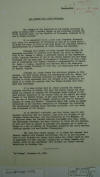
|
22. November 15,
1932. G-2 Translations of
local press: "The Yankees will
leave Nicaragua," La Prensa
(Nov 10), "The Policy in the
Republic of Nicaragua," El
Nacional (Nov 11), "General
Sandino intends to keep on
Fighting," La Prensa
(Nov 14), Capt. Robert E.
Cummings, Acting Military
Attaché, Mexico City, p. 2.
"
. . . Translation ¶ THE YANKEES
WILL LEAVE NICARAGUA ¶ The
triumph of the Democrats in the
recent elections is going to
bring about a radical change in
the relations between the North
American Union and the Republic
of Nicaragua, occupied up to now
by Yankee Marines. ¶ It is
understood to be a fact that
President Roosevelt will order
the evacuation of Nicaragua as
soon as he takes office on March
4th next, if this is not done
sooner by President Hoover’s
administration at Secretary of
State Stimson has promised. ¶
Although this matter is being
treated with reserve, we
succeeded yesterday in learning
that during the visit to Mexico
City of Mr. Newton D. Baker, a
prominent member of the
Democratic party, formerly
Minister of War in the Wilson
Cabinet and now being discussed
for the same post in Roosevelt’s
Cabinet,- he held a number of
conferences with General
Sandino’s representative in
Mexico, Dr. Pedro J. Zepeda,
regarding the attitude which the
Democrats would take toward
Nicaragua if they won, and
especially with respect to
General Sandino. ¶ Although Dr.
Zepeda keeps the strictest
silence on this subject, and
even denies having had
conferences with Mr. Baker, yet
among the Central American
residents of this Capital much
satisfaction is being expressed
over the triumph of Mr.
Roosevelt, because it is taken
for granted that the Yankee
Marines will withdraw from
Nicaragua. ¶ It is also stated
that Mr. Baker assured the
Sandino elements residing in
Mexico City that the United
States had abandoned the project
of opening the Nicaraguan Canal
because in the last defense
maneuvers of the Panama Canal by
the aerial and naval fleets of
the United States, it was seen
that that Canal, as well as the
one of Nicaragua if opened,
could at any time be rendered
useless by enemy air fleets.
Therefore Uncle Sam, being no
longer interested in the
military occupation of Nicaragua
for defending the interoceanic
passage which had been
projected, will now order the
withdrawal of his troops. ¶ As
to Sandino’s attitude, now that
things seem to have changed
completely for his country, both
with the triumph of the Liberals
Sacasa-Espinosa, and the
evacuation by the Yankees, it is
believed among the Central
American residents here that,
since the Nicaraguan chieftain
has been fighting to throw out
the Marines, he will now have no
reason to continue the struggle
as it would no longer be a war
of defense of Nicaraguan
integrity but civil warfare,
fighting against his own brother
Nicaraguans. ¶ For this very
potent reason, it is taken for
granted that General Sandino
will suspend hostilities, but it
is not believed that he will
disband the troops which under
his orders would be able to
guarantee the most complete
tranquility in Nueva Segovia
territory, which he has
constantly held without the
Ynakee [Yankee] Marines being
able to dislodge him. ¶ “La
Prensa”, November 10, 1932. . .
. "
|
|
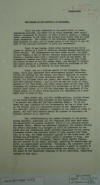
|
23. November 15,
1932. G-2 Translations of
local press: "The Yankees will
leave Nicaragua," La Prensa
(Nov 10), "The Policy in the
Republic of Nicaragua," El
Nacional (Nov 11), "General
Sandino intends to keep on
Fighting," La Prensa
(Nov 14), Capt. Robert E.
Cummings, Acting Military
Attaché, Mexico City, p. 3.
"
. . . Translation ¶ THE POLICY
IN THE REPUBLIC OF NICARAGUA. ¶
There are some countries in the
world which, by their geographic
position, and above all by their
weakness, must permit foreign
influences to dominate in their
domestic affairs, - affairs
which, according to all human
and natural laws whould [would]
only be aired among themselves.
The history of the different
peoples presents many examples
of this, and in recent years it
has fallen to the ill luck of
the American Continent to prove
our statements. ¶ First it was
Panama, whose fatal destiny it
was to be placed by nature as a
belt of territory between
Central America and South
America. The consequences are
well known to all: in order to
save vessels a run of several
thousand miles, and particularly
to furnish a foreign power with
a strategic point on the globe,
the dismembered country saw
itself deprived of a strip of
land along the border of what is
now the Panama Canal, and
obliged to consent that armed
forces of a powerful nation
should be stationed on its own
soil; in a word, its liberty is
very relative. ¶ Later, and as a
logical result of the foregoing,
Nicaragua, which also possesses
most advantageous natural
characteristics for joining the
two oceans, saw itself deprived
of certain liberties inherent in
every sovereign nation. It was
to be expected; the Colossus
could not permit that another
nation should gain more favored
rights, - and in this we see its
point of view, because if not
that power, any other nation
might do the same with Nicaragua
and perhaps would carry its
intentions so far as to open
another Canal which, if it did
not take away the supremacy of
the Panama Canal, it at least
would diminish its importance as
a strategic base in case of war.
¶ Many months ago, and with
futile motives, landing forces
of the North American Navy
encamped in the Republic of
Nicaragua (to correct her sons
who had been behaving badly). We
do not doubt the good intention
of the interventor; but we do
think that in the present case
the celebrated phrase of the
“Benemérito of the Americas”
could be applied,- “Respect of
the rights of other is peace”,
and that each country should be
allowed to ventilate its
domestic affairs as it sees fit.
¶ Now, notwithstanding the
recent struggle in the
neighboring Republic, elections
for its President have been held
under the supervision of Admiral
Woodward, Chief of the American
forces stationed there. Before
the electoral campaign, the
Admiral invited the future
candidates to a banquet in order
to advertise to the world that
the contestants would dedicate
themselves to the policy
impressed without any manifest
shadow of envy passing over
them; that is to say, the Saxon
character applied to the Latin
race. But Sandino was
overlooked, - perhaps owing to
pressure of time. The so-called
Liberator of Nicaragua, General
César Augusto Sandino, was not
invited to the feast, although,
according to unconfirmed
reports, he enjoys great
popularity. Naturally, the
insurgent chieftain would not
attend, because for a patriot it
would be painful to see that, as
viands are distributed during
the dinner, so also is the soil
of the fatherland disposed of by
an individual, completely
foreign to that soil. . . . "
|
|
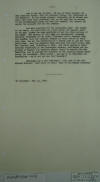
|
24. November 15,
1932. G-2 Translations of
local press: "The Yankees will
leave Nicaragua," La Prensa
(Nov 10), "The Policy in the
Republic of Nicaragua," El
Nacional (Nov 11), "General
Sandino intends to keep on
Fighting," La Prensa
(Nov 14), Capt. Robert E.
Cummings, Acting Military
Attaché, Mexico City, p. 4.
"
. . . And it was so, in fact. To
one of those present, Dr. Juan
Bautista Sacasa, fell the
choicest slice,- the Presidency
of the Republic. To the others
present, naturally and by common
consent, fell also their
portions; but, as the host who
is serving in all circumstances
keeps the best for himself, the
Admiral reserved the desserts
for his own country. ¶ And what
remained for the Liberating
Army? The crumbs of the feast,
the left-overs of a land which,
not because small on the map,
lacked the same symbolism of all
the other nations of the globe.
The members of that army are
visionaries, dreaming warriors,
defenders of the right
(“derecho”—law?); because they,
the deluded, have the tropical
jungles of their nations as
their only home, and all the
privations of a roving army as
pay for their patriotism. From
the mountain tops they will see
their cities like the Promised
Land, forbidden to them. And
while Sandino’s hosts continue
vegetating in the Nicaraguan
forests, half-naked and
perishing of hunger, the
Republic adorns itself to
receive its new Executive, and
to shortly bid farewell to the
American troops which occupy its
territory. (This latter – and
may we be forbidden our
incredulity – we do not yet see
very clearly!) ¶ Nicaragua has a
new President. – Yes, but it has
not changed Masters. What pride
of race! Hail to the Monroe
Doctrine! ¶ “El Nacional”, Nov.
11, 1932. . . . "
|
|
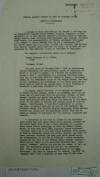
|
25. November 15,
1932. G-2 Translations of
local press: "The Yankees will
leave Nicaragua," La Prensa
(Nov 10), "The Policy in the
Republic of Nicaragua," El
Nacional (Nov 11), "General
Sandino intends to keep on
Fighting," La Prensa
(Nov 14), Capt. Robert E.
Cummings, Acting Military
Attaché, Mexico City, p. 5.
"
. . . Translation ¶ GENERAL
SANDINO INTENDS TO KEEP ON
FIGHTING IN THE SEGOVIAS
(NICARAGUA) ¶ A propos an item
published by “La Prensa” a few
days ago on impressions obtained
among Central American residents
in this metropolis as to what
General Sandino’s attitude would
be when the Yankee Marines were
withdrawn from Nicaragua next
January, Dr. Pedro José Zepeda,
his representative in México,
addresses this paper (“La
Prensa”) a letter denying that
he had a conference with Mr.
Newton Baker when the latter
visited this Capital, and
stating that General Sandino
would continue the fight, as he
does not acknowledge Dr. Juan
Bautista Sacasa as President of
Nicaragua. ¶ Dr. Zepeda’s
interesting letter is as
follows: ¶ “Señor Director of LA
PRENSA, ¶ City. ¶ “Esteemed
friend: ¶ “In your issue of
November 10th I find an
interesting article regarding
the international aspect of
Nicaragua in which it is made to
appear,- in a direct and
unjustified manner,- that I
participated in a supposed
interview sometime ago in this
city with Mr. Newton D. Baker, a
prominent member of the
Democratic Party of the United
States, and that at that
conference the withdrawal of the
North American Marines from my
country was agreed upon, in case
Franklin D. Roosevelt’s
candidacy triumphed in the
elections. ¶ “I regret, Señor
Director, to be obliged to
correct LA PRENSA in this
matter, since I am convinced
that the article was not
published with any malicious
intent, as both General Sandino
and myself can affirm with the
most profound satisfaction that
your daily has been one of the
champions of the cause of
liberty and justice which we
have defended. Nevertheless, I
take this opportunity to assure
you that, no matter what may be
said to the contrary, our
attitude toward this problem
remains unchanged, since neither
Moncada, nor Sacasa, nor the
well-known Adolfo Díaz can be
taken as pledges of guarantee
for the national integrity and
decorum. ¶ “I purposely do not
wish to allude to the electoral
farce which has just taken place
in my country, because all the
world knows that it was a farce
unworthy of a nation which takes
itself seriously, as does the
United States, which, in this
very year 1932, appoints ‘great
electores’ (‘grandes
electores’), and with fixed
bayonets, with troops of Marines
occupying nearly the entire
country, and with its great
cruisers training its guns upon
ports ungarrisoned and
defenseless, on the 7th of
November – after carefully
concealing the fact of the
combats which General Sandino’s
brave forces fought on the
so-called election day,- sends
Admiral Woodward, smiling and
rubbing his hands, to tell us
that ‘the Nicaraguan people are
now fit for democracy’, that
‘there will be no need of
supervision of the next
elections’, but that he leaves
us Dr. Sacasa, ‘elected’ by
‘popular vote’ with a majority
of more than 20,000 votes . . .
"
|
|
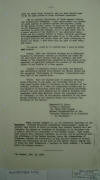
|
26. November 15,
1932. G-2 Translations of
local press: "The Yankees will
leave Nicaragua," La Prensa
(Nov 10), "The Policy in the
Republic of Nicaragua," El
Nacional (Nov 11), "General
Sandino intends to keep on
Fighting," La Prensa
(Nov 14), Capt. Robert E.
Cummings, Acting Military
Attaché, Mexico City, p. 6.
"
. . . over the White House
favorite, who has been imposed
upon us by the same system on
three different occasions. ¶ “By
the express instruction of Señor
General Sandino, and through
your newspaper, I come again
before the peoples of Latin
America to protest against the
unlawful policy of the United
States, which, in spite of the
armed protest of the Nicaraguan
people, has insisted in carrying
out an election in every way
illegal, as it is well known
that in a great portion of the
Republic it was physically
impossible for the invading
forces to compel citizens
identified with our cause to go
to the polls, and in other
sections our troops drove off
those attempting to direct the
farce, - whic [which] were only
too glad to save their own
skins. ¶ “To sum up, allow me to
confirm what I have so often
said before: ¶ “First: That the
‘Ejercito Defensor de la
Soberanía Nacional de Nicaragua’
classes as traitors all those
who for any reason have treated
with the invaders, who have
hushed up the assassinations
committed by the forces of
occupation, or passively
accepted the insults of the
United States to our dignity of
a free people. ¶ “Second: We
repudiate before the world the
treaties and conventions entered
into between the United States
and the so-called ‘Governments
of Nicaragua’ (Administrations)
from 1910 to the present date. ¶
“Third: That the supreme gift of
national free-will being
incarnate in our army, and
believing that no foreign power
has the right to intervene in
the solution of the internal
problems of a free and
independent nation, such as the
Republic of Nicaragua since
1821, we declare absolutely
invalid the acts just carried
out by Admiral Woodward, who
announces Señor Juan Bautista
Sacasa the President-elect of
Nicaragua, as this is the
express attribute of the
Sovereign Congress of the
Republic under the Political
Constitution of the Nation.” ¶
Respectfully yours, ¶ “Patria y
Libertad” ¶ Dr. Pedro José
Zapeda [Zepeda], ¶ General
Representative of the “Ejercito
Defensor de la Soberanía de
Nicaragua.” ¶ Señor Jacinto
Jiménez M., of the Executive
Committee of the “Partido
Renovador Autonomista
Nicaragüense”, sends us another
long letter in which he states
that General Sandino will not
recognize Dr. Sacasa as
President of Nicaragua as he
considers him a servile tool of
the Government of the United
States. That therefore Sandino
will continue fighting, as he
will not be satisfied with the
withdrawal of the Yankee
Marines, since the independence
of Nicaragua demands the
destruction of any indirect
system of colonization and
development on the part of the
United States, making use of
those who lend themselves –
traitors to their country – to
meekly serve the foreign
invader. ¶ “La Prensa”, Nov. 14,
1932."
|
|
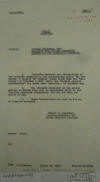
|
27. November 15,
1932. G-2 Translations of
local press: "A Victory
for Sandino," El Universal
(Nov 4), and "Protest against
Intervention," Excelsior
(Nov 2), Capt. Robert E.
Cummings, Acting Military
Attaché, Mexico City, p. 1.
"G-2 Report ¶ 3850-a ¶ MEXICO ¶
POLITICAL ¶ SUBJECT: Foreign
Relations, etc. ¶ Relations with
Foreign Countries: ¶ SANDINO and
the Nicaraguan Situation. ¶ 1.
Forwarded herewith are
translations of two articles
appearing in the Metropolitan
press, the one headed “A Victory
for Sandino” being taken from
the “Universal” of November 4,
1932, while the “Protest against
Intervention” was taken from
“Excelsior” of November 2nd. ¶
2. The telegram mentioned in the
latter article as having been
sent to Ambassador Clark by the
“Partido Renovador Autonomista”
has not yet been received by
him. ¶ 3. These translations are
sent to G-2 as of possible
interest. ¶ Robert E. Cummings,
¶ Captain, Infantry, DOL ¶
Acting Military Attaché. ¶
Source: Press. ¶ C/p ¶ From:
M.A.Mexico. ¶ Report No. 4237. ¶
Date: Nov. 4, 1932. . . . "
|
|
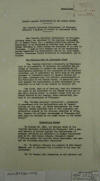
|
28. November 15,
1932. G-2 Translations of
local press: "A Victory
for Sandino," El Universal
(Nov 4), and "Protest against
Intervention," Excelsior
(Nov 2), Capt. Robert E.
Cummings, Acting Military
Attaché, Mexico City, p. 2.
"
. . . Translation ¶ PROTEST
AGAINST INTERVENTION BY THE
UNITED STATES ¶ The “Partido
Renovador Autonomista” of
Nicaragua Addresses a Message of
Protest to Ambassador Clark ¶
The “Partido Renovador
Autonomista” of Nicaragua,
(Mexican Group) has addressed to
the American Ambassador, Mr. J.
Reuben Clark, Jr., a message
protesting against the
supervision to be exercised by
American Army forces next Sunday
(November 6, 1932) during the
elections to be held in
Nicaragua. A copy of this
message and of the resolutions
passed condemning the
declarations made by Dr. Luís
Manuel Debayle, Nicaraguan
Chargé d’Affaires in Washington,
are as follows: ¶ The Telegram
sent to Ambassador Clark ¶ “The
‘Partido Renovador Autonomista
de Nicaragua,’ born of the
necessity to reconquer and
maintain the autonomy of
Nicaragua to promote the
restoration of its institutions
according to the exigencies of
its historic evolution, and to
constitute the civil wing of the
armed movement of liberation
headed by General Sandino and
his army, addresses you, the
official representative of the
Government of the United States,
in energetic protest against the
intervention of your Government
in the elections to be held in
our country on November 6th. ¶
“Our Party, made up of free men,
does not recognize the right of
the Government of the United
States nor of any other foreign
power, to concern itself with
the internal affairs of our
country, which exclusively
pertain to the sovereignty of
Nicaragua. ¶ “The ‘Partido
Renovador Autonomista’,
proceeding in accordance with
the declarations made by General
Sandino and his army, and which
declarations the Party supports,
hereby announces that it will
repudiate the authorities
elected in the farcical
elections of November, because
the national sovereignty of
Nicaragua will once again be
outraged by the armed forces of
the United States.” ¶
Resolutions Passed ¶ “On October
25, 1932, the Mexican Group of
the ‘Partido Renovador
Autonomista de Nicaragua’ held a
general meeting of protest
against the declarations of
cringing servilism and
submission to Yankee Imperialism
made by Dr. Luís Manuel Debayle,
Moncada’s Chargé d’Affaires
before the American State
Department, and passed the
following unanimous resolution:
¶ “I. To declare infamous the
conduct of Luís Manuel Debayle,
and to pronounce him a traitor
to his race and fatherland. ¶
“II. To forward this Resolution
to all cultural and . . . "
|
|
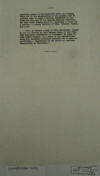
|
29. November 15,
1932.
G-2 Translations of local press:
"A Victory for Sandino," El
Universal (Nov 4), and
"Protest against Intervention,"
Excelsior (Nov 2),
Capt. Robert E. Cummings, Acting
Military Attaché, Mexico City,
p. 3.
"
. . . political groups on the
Continent which are lending
their aid to the emancipation of
our peoples,- and to petition
them to adopt a similar
resolution so that among all
free men of the Spanish-American
countries, the said Señor
Debayle shall be considered a
felon and a traitor,- a worthy
imitator of Díaz, Moncada,
Sacasa, etc.; and ¶ “III. To
forward a copy of this
Resolution, signed by all the
members of this Mexican Group of
the ‘Partido Renovador
Autonmista de Nicaragua’ to
Señor Dr. Luís Manuel Debayle,
as a reply to the declarations
which his incurable cretinism
prompted him to make in
petitioning a lengthening of the
period of American Intervention
in Nicaragua.” . . . "
|
|
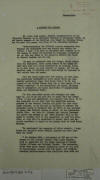
|
30. November 15,
1932. G-2 Translations of
local press: "A Victory
for Sandino," El Universal
(Nov 4), and "Protest against
Intervention," Excelsior
(Nov 2), Capt. Robert E.
Cummings, Acting Military
Attaché, Mexico City, p. 4.
"
. . . Translation. ¶ A VICTORY
FOR SANDINO ¶ Dr. Pedro José
Zepeda, general representative
of the “Ejercito Defensor de la
Soberanía Nacional de Nicaragua”
which, in the heroic crusade of
the Segovias, has faced the
invading forces for the past
five years, has given us the
following bulletin: ¶
“Notwithstanding the official
reports emanating from Managua
and Washington that our troops
only suffer reverses, I feel it
my duty to enlighten your
readers as to the manner in
which the fighting in Nicaragua
is carried on, so they may judge
of the gigantic efforts put
forth by General Sandino and his
men. ¶ “It must be confessed
that our troops, which always
take the offensive, never give
combat to the enemy except when
they have every probability of
winning, since, as is well
known, we lack the sources of
supply, and the ammunition used
in fighting must immediately be
replaced by that seized from the
enemy. ¶ “All the world knows
that our coasts, on both seas,
are completely blockaded by
naval units which are constantly
patrolling them; that daily from
6 to 12, war planes of the
United States Navy fly to the
region of the “Heroic Segovias”
to sow desolation and death,
flinging tons of explosives and
large quantities of asphyxiating
gases and incendiary bombs. ¶
“In this one-sided manner our
struggle has been kept up, and
if we are now able to prove that
our effectives, in men and
ammunition, are greater than
ever, it is due precisely to the
fact that the guerrilla warfare
adopted by our General Sandino
has given the most brilliant
results, as we are now in
position to prevent the
electoral farce on November 6th,
by which it was intended to
place Juan Bautista Sacasa in
power, or the celebrated Adolfo
Díaz. And both Mr. Stimson and
Admiral Woodward, the latter now
acting as the ‘Gran Elector’
will be obliged to confess that
it was impossible to hold the
election, or they will be
compelled to select their own
favorite candidate to carry on
the dreary work of José Maria
Moncada. ¶ “To counteract the
campaign of false reports, I
copy below the bulletin which
General Sandino has just sent
from the field: ¶ “On October
28th a detachment of 300 men of
the forces of the valiant
General Juan Pablo Umanzor, laid
an ambuscade for the enemy
composed of United States
riflemen and National Guards.
The encounter, which took place
twenty kilometers north of the
city of Chichigalpa, lasted over
six hours, and notwithstanding
reinforcements were mobilized
from León and . . . "
|
|
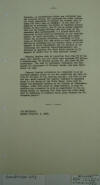
|
31. November 15,
1932.
G-2 Translations of local press:
"A Victory for Sandino," El
Universal (Nov 4), and
"Protest against Intervention,"
Excelsior (Nov 2),
Capt. Robert E. Cummings, Acting
Military Attaché, Mexico City,
p. 5.
"
. . . Nagorate, an overwhelming
defeat was inflicted upon the
invading forces, who abandoned
the field leaving all their
implements of warfare and
without time to carry off their
dead or wounded. It has been
impossible to determine the
number of American marines
killed in this battle, but it
can be safely asserted that all
the Yankee officers who took
part in the encounter were
exterminated, - a report which
will certainly be kept from the
knowledge of the American
people, as their Government is
charged with supervising the
so-called elections, scheduled
to take place on November 6th,
and which we shall resolutely
nullify by attacking all the
sectors where it is attempted to
place detachments for the
purpose of intimidating and
forcibly compelling peasants and
laborers to sanction the farce
being carried on in support of
Adolfo Díaz or Juan Bautista
Sacasa.’ ¶ “General Sandino ends
by reporting that over 80 of the
enemy were killed; and that
there were captured 127 rifles,
5 machine-guns, 70 pistols
caliber 45, and about 25,000
cartridges. The body of
Lieutenant Sotomayor, who
commanded the detachment of
National Guards, was also found
among the dead. ¶ “General
Sandino reiterates his intention
to go on fighting against either
of the two candidates put into
office by the guns of the
American marines, and that in
the few days which remain for
Admiral Woodward to announce
which is the choice of the White
House, there will be fought the
bloodiest battles in the history
of Nicaragua,- because, after
five years of armed protests, we
want to reaffirm our intention
to give no opportunity to the
invading forces to consider that
they have any right whatever to
intervene in problems which
alone concern the Nicaraguan
people.” ¶ “EL UNIVERSAL” ¶
Mexico City, Nov. 4, 1932."
|
|
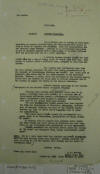
|
32. November 3, 1932.
G-2 Report on Current Situation,
Major A. R. Harris, Military
Attaché, Costa Rica.
"G-2
Report. ¶ NICARAGUA. ¶ Subject:
Current Situation. ¶ The
political pot is boiling in
Nicaragua. According to reports
received here, all Nicaraguans
have ceased to talk or think of
anything but POLITICS. Both the
Conservatives and Liberals claim
victory. Although it is
practically impossible to get an
unbiased opinion from a
Nicaraguan, it is still believed
that the Liberals will win by a
small majority. ¶ A certain
Augusto Estrada Aragón has sued
Adolfo Díaz for a sum of money,
which he claims Díaz owes him.
This action is without doubt a
political move, designed to
embarrass don Adolfo. ¶ The
bandits have infiltrated down
into the more settled districts
and have been making
demonstrations in the vicinity
of Chichigalpa, Jinotega and
Estelí. This seems part of
Sandino’s plan which aims at the
embarrassment of the Electoral
Mission. However, a rumor, which
was published in the Managua
papers, states that the bandits
are being paid by certain
prominent men in the country to
hamper the voting in the Liberal
districts. ¶ Another article
appearing in the Managua
newspapers on the current bandit
situation follows: ¶ “Persons
just arrived from Jinotega state
that it is public knowledge
there that Pedrón, in a singular
act of mountaineer militarism
issued a proclamation declaring
his total independence from
Augusto C. Sandino, distributing
this news to all groups under
his command. ¶ “In this
proclamation Pedrón stated that
from September 15th the
departments of Chontales,
Matagalpa, northern part of
Managua, Jinotega and part of
the Atlantic Coast, between San
Juan del Norte and Prinzapolka
will be under his jurisdiction.
¶ “The place where Pedrón issued
his proclamation is a place
close to El Embocadero,
jurisdiction of Bocay, called
“El Ideal”. ¶ “It appears that
he adopted this decision after
visiting Santa Tomás and other
places in Chontales the last
time, where he had interviews
with politicians of this
department. ¶ “Pedrón assembled
the different forces under his
command at “El Ideal” and
harangued them, sowing
anti-Sandino sentiment.” ¶ Note:
(It is a well known fact that
Sandino and Pedrón Altamirano
have not been getting along well
together. Pedrón, however, has
been so strong in his own
regions that Sandino has not
dared to discipline him.) ¶
Source: Press. ¶ From: M.A.
Costa Rica ¶ A. R. Harris, ¶
Major, G.S., M.A. ¶ Report No.
1821 ¶ Date: November 3, 1932."
|
|
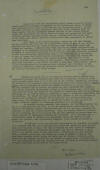
|
33. November 1, 1932.
Electoral Mission, Bandit
Activities, p. 1 only.
"Immediately
after the registration period
closed, in early October, bandit
activities increased
perceptively in the Northwestern
corner of Chinandega Department
and in other localities near the
Honduranian Border. However, the
heavy rainfall in these
mountainous districts, which
continued until the 15th,
together with the subsequent
renewed activity of the Guardia
Nacional (freed from protective
duty of the Electoral Mesas, and
reorganized into heavy offensive
patrols) kept this menace down
to a minimum until the latter
part of the mouth, when several
important contacts were made,
principally in Chinandega
Department. ¶ With regard to the
bandit situation, rumors are
rife that between now and
election day there will be
concentrated attacks on many of
the outlying districts and also
that the cities of Managua,
Leon, Chinandega, Esteli and
Granada are menaced. We believe
that these reports are greatly
exaggerated and purposely so by
government authorities, who have
not only kept the Press stirred
up in regard to such bandit
activities but we actually know
that Government officials in
some Departments have
deliberately lied to the
President, or by his order, to
make it appear that conditions
are considerably worse than they
really are. I have had several
conferences with General
Matthews, Jefe Director of the
Guardia Nacional, and he concurs
in this opinion. Nevertheless,
comprehensive plans have been
made by the Guardia Nacional to
have heavy combat patrols
conduct active reconnaissances
in the menaced areas between 2
and 8 November for the purpose
of reassuring voters and
preventing bandit interference
with elections, and intercepting
passage of bandit groups. ¶
During the early part of the
month we received several
reports from Nicaraguan[s?]
returning from Honduras that
there was an impending
revolution which would probably
break prior to or on the day of
the Honduran President elections
(30 October); that Government
arms and ammunition were being
distributed to Sandinistas who
had promised to assist the
Liberal candidate, Dr. Zuniga
Huete; and that between 6 and 10
October the latter has sent
twenty-six (26) pack-mule loads
of war materials (principally
rifles) to be distributed among
revolutionists mobilized along
the border for the purpose of
interfering with the Honduranian
elections, or, in case he should
be defeated, to start a
revolution immediately after the
election. The report was also
current that, whether or not the
services of Sandino were
required in Honduras for
carrying out the above-mentioned
plan; inany [in any] event, the
Sandinistas were to recross the
border in time to carry out a
major offensive against the
Nicaraguan elections on 6
November. ¶ We received reports
yesterday from Honduras that the
Conservatives had won by a large
majority and that, so far, no
revolutionary activities had
been begun by the defeated
Liberal candidate who had, on
the contrary, requested his
adherents to take the results
peacefully. Thus, the Sandino
threat in Honduras did not
eventuate, and it is possible
that the war materials
above-mentioned are being
prepared for Nicaraguan
elections on 6 November. It is
believed that a Conservative
regime in Honduras will
materially reduce the traffic in
arms across the frontier, thus
considerably hampering future
bandit activities in Nicaragua.
¶ In addition to the war
materials mentioned in the
preceding paragraph, it is
learned from very good authority
that rifles and ammunition have
recently come into Nicaragua by
way of the Gulf of Fonseca and
were landed at Tempicque in
northwestern part of Chinandega
Department, and also at
Tamarindo a small port on the
Pacific coast of Leon
Department. Information was also
received from a reliable source
that two Nicaraguan agents of
Sandino in Mexico City have been
unusually active during the
early part of October,
collecting arms, ammunition and
medical supplies for the purpose
of despatching to Sandino, and
that the quantities of arms and
supplies procured indicated an
offensive movement of major
importance on the part of the
bandit forces."
|
|
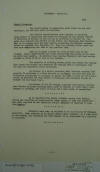
|
34. ca. November 1, 1932.
G-2 Intelligence Summary of
Bandit Situation, Nicaragua, p.
1 only.
"NICARAGUA
– Political. ¶ 3020 ¶ Bandit
Situation. ¶ The bandit supply
of ammunition still finds its
way into Nicaragua, for the most
part, via Honduras. ¶ The
bandits unquestionably have
obtained an unusually large
amount of ammunition this month
as evidenced by the contact
outside of Somotillo on October
25 and the one at La Pelona on
October 27. Reports also
indicate the arrival of 400
rifles into Nicaragua from
Honduras. This is in keeping
with the many reports concerning
the bandits’ maximum effort at
election time (November 6). They
are probably better armed and
have more ammunition now than at
any previous time. ¶ Food is no
great problem for them as they
live on the country. Money
contributions are still forced
from the people in the areas in
which they operate. In addition
they receive financial aid from
various persons in areas in
which they do not operate. ¶ The
practice of stealing horses,
mules and cattle and running
them across the border into
Honduras and selling them or
exchanging them for arms and
ammunition still continues. ¶ On
October 14 a native returning
from Honduras reported that
recently 26 muleloads of rifles
arrived in Los Manos, and were
destined for Nicaraguan
Sandinistas in vicinity of
Ayote, who were to help out in a
revolution in Honduras and then
return to Nicaragua with
Honduran forces to disturb the
elections there. ¶ On October 20
the CO, Jalapa, reported
information received that
Toribio Tijerino recently made a
gift to Sandino of 1,000 hats,
1,000 changes of clothing, 500
pairs of shoes and 3 mule loads
of ammunition. ¶ It is reported
from fairly reliable source that
Sandino forces are receiving an
exceptionally large supply of
arms and ammunition and other
supplies in the immediate
future. Shipment is reported to
come from Mexico. ¶ Sandino’s
main camp is believed to be in
vicinity of Oconguas (262-378).
Camp consists of 10 houses
rather close together, on a loma
which is not wooded, and
therefore not well hidden; it is
surrounded by a net-work of
outposts."
|
|
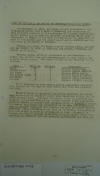
|
35. November 1, 1932.
G-2 Intelligence Extract on
Visit of the Naval Attaché to
the Honduran-Nicaraguan Border
on 3 Sept, p. 1.
"VISIT
OF THE NAVAL ATTACHE TO THE
HONDURAN-NICARAGUAN BORDER. ¶ On
September 3, 1932, the Naval
Attaché proceeded to the
Nicaraguan border with a view to
observing the conditions in that
vicinity relative to the
movements of Nicaruan
[Nicaraguan] bandits and bandit
agents and to view the progress
of General Plata (new Comandante
of Danlí) in his work of
preventing the smuggling of arms
to the bandits and the rendering
of aid to SANDINO and his
followers by residents in
HONDURAS. ¶ During this visit
the Naval Attaché visited DANLI,
PARAISO and SAN MARCOS DE COLON
in HONDURAS, and OCOTAL,
TOTOGALPA and SOMOTO in
NICARAGUA. ¶ General PLATA,
although designated as the
Comandante of DANLI, has control
over all subcomandantes in that
section and a small mobile
force. The number of men at his
disposal are as follows: ¶ Post
¶ Enlisted ¶ Officers ¶
Commander ¶ DANLI ¶ 18 ¶ 3 ¶
Colonel MARCO VACA ¶ MOBILE
force ¶ 25 ¶ 1 ¶ Colonel MANUEL
ESPINAL ¶ LAS MANOS ¶ 4 ¶ 1 ¶
Captain REYES MENDEZ ¶ SAN
MARCOS COLON ¶ 10 ¶ 1 ¶ Colonel
PASCUAL MONTOYA ¶ CIFUENTES ¶ 4
¶ 1 ¶ Captain JESUS MARTINEZ ¶
PARAISO ¶ 4 ¶ 1 ¶ Captain
VICENTE SANCHEZ ¶ He is supposed
to have twenty police inspectors
operating with him but at the
time of this visit only four had
reported for duty. ¶ PLATA’s
force is untrained and poorly
equipped, his armament
consisting of obsolete single
shot Remington rifles and two
LEWIS machine guns. Although his
mobile force is actively
patrolling, it is doubtful if
his entire command could
accomplish anything should it
contact any sizeable group of
SANDINO’s forces. The utmost
that PLATA can accomplish is to
make the shipment of arms to
SANDINO difficult and prevent
the sale of bandit loot in
HONUDRAS. Some indications are
that he is working energetically
with the object in view of
accomplishing this. It would be
foolish for him to attempt
preventing a large bandit force
from crossing the frontier but
his presence discourages the
free use . . . "
|
|
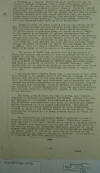
|
36. November 1,
1932. G-2 Intelligence
Extract on Visit of the Naval
Attaché to the
Honduran-Nicaraguan Border on 3
Sept, p. 2.
"
. . . of HONDURAS as a refuge.
During the visit information was
received at OCOTAL, Nicaragua,
that a group of bandits, after a
contact with the Guardia, had
started to enter HONDURAS but
had been prevented by PLATA’s
force. However, the Naval
Attaché doubts that the strength
of PLATA’s force had anything to
do with keeping the Sandinistas
out but the bandits did not care
to offend HONDURAS, knowing well
that should residents along the
border become antagonistic or
unfriendly, free movements along
that section would become
difficult. They will however
continue to slip into HONDURAS
where they can do so unobserved.
¶ PLATA informed the Naval
Attaché that he has several of
his men on espionage work and
that friendly people have
promised to keep him informed of
any movement of arms towards
Nicaragua. His mobile force is
operating along the border south
of DANLI. In this manner he is
hopeful of getting information
that will lead to the capture of
arms shipments should there be
any passing through that
section. Although PLATA’s
interest was doubtful due to the
failure of the Government to pay
him or his officials their
salaries, that obstacle has been
overcome, at least temporarily,
and PLATA is moving his family
from SAN MARCOS DE COLON to
DANLI. This will have a tendency
to keep him in that section
which is believed to be the
center of the most important
area. ¶ The people of DANLI seem
pleased with the appointment of
PLATA and believe that he will
do much to prevent activities of
agents of SANDINO. There was no
information available indicating
that there had been any recent
activities but PLATA was
investigating a visit to
TEGUCIGALPA of ALFONSO IRIAS and
RAMON RAUDALES whom he suspected
of engaging in SANDINO business.
PLATA stated that if his
suspicions prove to be true he
will have these two individuals
removed to TEGUCIGALPA and
forced to remain in that city. ¶
On August 20th, General PLATA
held a conference at LAS MANOS
with Colonel T. E. WATSON, Jefe
of the Guardia Nacional at
OCOTAL, and the Jefe Politico of
the same place. General PLATA
stated that the conference was
very successful and an agreement
had been reached for mutual
cooperation in preventing the
bandits from receiving aid from
HONDURAS. While in OCOTAL, the
Naval Attaché was informed by
Colonel Watson, that Plata was
apparently working with him and
forwarding information helpful
to the functioning of the
Guardia. ¶ The Naval Attaché
spent two days in OCOTAL and
returned overland to Honduras
via TOTOGALPA and SOMOTO. During
this time, the workings of the
Guardia were observed with much
interest. The efficiency and
smoothness with which the
patrols and organization
functions is to be highly
complimented. The section
through which the Naval Attaché
passed is being effectively
covered in spite of the limited
number of men available. Every
facility was extended to the
Naval Attaché during his visit
to this area. ¶ The Comandante
in SAN MARCOS COLON is supposed
to have a force of ten men
stationed in that place. There
were however none observed by
the Naval Attaché and a reliable
resident stated that actually
the Comandante had but two men
in active service. The section
around SAN MARCOS was very quiet
and most of the residents were
working their farms and not
interested in SANDINO. The
people cannot be considered
generally as friendly to nor
against SANDINO but seem to
display no interest; it is
doubtful he receives aid thru
that part of Honduras. ¶ (over)"
|
|
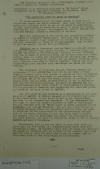
|
37. November
1, 1932. G-2 Intelligence
Extract on Translated Editorial,
"The Sandinismo Does Not Exist
in Honduras," El Pueblo,
Tegucigalpa (Sept 29), p. 1.
"THE
following editorial from a
TEGUCIGALPA, HONDURAS newspaper
is quoted for general
information: ¶ Translation of an
editorial published in “El
Pueblo” (local independent daily
newspaper) Thursday, 29
September, 1932. ¶ Tegucigalpa,
Honduras. ¶ “THE SANDINISMO DOES
NOT EXIST IN HONDURAS” ¶ It is
characteristic of the human
makeup to look for in others the
reason for one’s failures. Each
time that an artist, writer or a
governor fails in one of his
works or aspirations, he must
find someone or something on
which to place the
responsibility for such failure.
For example the case of GENERAL
MONCADA and GENERAL SANDINO in
NICARAGUA is typical. ¶ When the
government of the brother and
neighboring country is unable to
terminate “Sandinismo”, they
must look around for the means
to justify their impotence in
the eyes of the world and most
especially in those of the
NICARAGUANS. And, Oh God. of all
the absurd, the lot fell on
HONDURAS. ¶ HONDURAS has no
factories, neither Naval or
merchant Marine forces, her
imports come almost entirely in
American ships, nor has she
railroads on the Nicaraguan
frontier; in fact HONDURAS, that
has no means of producing arms,
nor of purchasing and
transporting them, is guilty and
responsible for the fact that
President MONCADA, the American
Marines and the Guardia
Nacional, etc[.], etc., have not
been able to destroy SANDINO.
Really any other excuse would
have resulted less rediculous
[ridiculous] and above all less
comical. ¶ The newspapers of
Nicaragua publish constant
reports of incursions of the
SANDINISTAS into cities and
towns of that Republic; almost
daily they inform of encounters
with the marines and Guardia
Nacional and speak of
individuals and even officers of
the Army who go to join the
rebel, without it occuring
[occurring] to anyone until now
(at least we know nothing of it)
to affirm or even say that
President Moncada, the American
Marines and the Guardia Nacional
give their consent to these
people to withdraw for the
purpose of fomenting and
sustaining for their own
personal benefits the acts of
war of SANDINO. ¶ All that
Honduras has received as a
consequence of the beligerance
[belligerence] of SANDINO is
serious damages in the property
and lives of her inhabitants, in
her security and in her
souvereingty [sovereignty]; and
even in her commerce and
economics. If any Government had
the right to take the stand of
accuser in view of the damages
she has received from the
“Sandinismo” it would certainly
not be Nicaragua, but instead
Honduras. But for the
justification of President
Moncada before his copatriots
and for those who seek in
political strife the victory of
the interventions and not that
of the votes, Honduras is not
only being made to suffer the
damages from the Sandinismo and
assume the responsibility for
these damages, but also the
obligation falls on her to
destroy SANDINO and pacify
Nicaragua. ¶ Fortunately such is
not the case, no more than could
you place upon her the burden of
a responsibility which does not
correspond to her. In Honduras
there does not exist one
Honduran who would be converted
into an accuser of his country,
much less make her bear a guilt
for which she is not to blame.
And if there were such… then
they would not be Hondurans. ¶
(over) . . . "
|
|
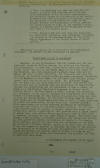
|
38. November 1,
1932. G-2 Intelligence
Extract on Translated Editorial,
"The Sandinismo Does Not Exist
in Honduras," El Pueblo,
Tegucigalpa (Sept 29), p. 2.
"
. . . Rodolfo Espinoza of the
so-called “Conservador” and
“Liberal” parties, respectively.
In this connection General
Sandino tells me: ¶ “ ‘From the
beginning our Army has had only
one object, and will only have
one until the end, - the
restoration of our national
independence. The different
phases of our struggle do not
matter. Therefore our Army
disregards the treaties, pacts,
and agreements signed behing
[behind] the backs of our
people, between the Governments
of North America and those
imposed by them, at the
bayonet’s point, against the
express will of the Nicaraguan
people from 1909 to the present
date. ¶ “ ‘This explains why our
Army does not recognize, nor
never will recognize, any
Government of Nicaragua imposed
by the super-vigilance of the
intervening Government of the
United States of North America.’
“ ¶ Following translation of an
article in the Honduranian
Newspaper, “El Pueblo” of 29th
September is quoted:- ¶
“SANDINISMO IS NOT IN HONDURAS”
¶ Sandino, is not in Honduras,
but his agents are, who are very
well known to Guillen Zelaya,
for they are his friends and
colleagues: He very well known
those that live in Tegucigalpa,
those that are in San Pedro Sula
and in other towns of the
republic, and very especially he
knows those that are in Danli,
who are the most effective, for
they are very near the frontier,
in constant communication by
means ofrunners [of runners]
frequently sent by Sandino to
that town. Of all those that
Guillen Zelaya knows, only one
are we going to name: Dr.
Alejandro Cerda, who for some
time has been radicated in
Danlí, and who is the most
active and who secures arms and
ammunition in Tegucigalpa,
through the authorities who are
followers of Zuniga Huete, as
Cerda is a fullfledged
“Huetista” (belongs to Zuniga
Huete, Liberal party). In the
Census of DANLI, through his
influence and intrigue, he was
able to arrange the inscription
of a large number of Nicaraguans
so that during the elections
they may come to vote for Zuniga
Huete. In the first fifteen days
of August last Cerda came to
Tegucigalpa and took to Danli a
large quantity of rifles and
ammunition, to see that they
reached SANDINO, which were
taken out of the National
Storeroom by government
employees who belong to the
Zuniga Huete faction. In the
same first fifteen days of
August, a certain commercial
house received from Albion a
quantity of .45c pistols with a
large quanty [quantity] of
ammunition, and another
Nicaraguan bought them to sent
[send] them to Sandino, by means
of the Agent Cerda in Danli. The
house that brought these pistols
is neither Honduran, nor German
nor French. All the Agents of
Sandino in Honduras as belong to
the Zuniga Huete faction, and at
the same time are colleagues of
the Post and Journalist Guillen
Zelaya. Later on we will give
the names of all the Agents of
Sandino in Honduras and that of
the persons who intervened to
withdraw the arms and ammunition
from the National Storerooms, to
deliver them to Cerda, and also
we will give the name of the
house that introduce the pistols
.45c and to whom they were sold.
¶ A NICARAGUAN WHO BELONGS TO NO
PARTY. ¶ (over)"
|
|
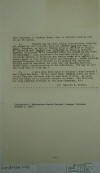
|
39. November 1, 1932.
Extracts from Intelligence
Reports of Sept-Oct, p. 5:
Excerpt from report by Maurice
G. Holmes.
"That
Guatemala is backing Huete; that
he believes Carilla will win at
the polls. ¶ 4. PERALTA was my
first caller this morning,
arriving all worked up over the
news that one ALFONSO LARA was
seen in DANLI, Honduras, as late
as October 12 with the view to
staging an interview with
SANDINO near CIFUENTES as early
as possible. SANDINO, he alleged
to be somewhere along the CRIQUE
DE ORO (250-378) (M.C.Map). LARA
represents the national juntas
of both political parties in
Nicaragua who desire terms with
SANDINO to secure peace in this
country after our evacuation.
RAMON RAUDALES entered Nicaragua
about October 11 to arrange the
interview. PERALTA further
expressed the view that the
Guardia Nacional should have a
representative at the
conference. (He may be sure that
they will if they can.) ¶ 5. I
give only face value to
Nolasco’s dope because I don’t
know him well. On the other
hand, PERALTA gives out very
little dope and believes what he
says when he does. AS usual with
his race, he is reliable subject
to check. The foregoing has been
reported verbally to the Area
Commander, G.N. ¶ /s/ Maurice G.
Holmes. ¶ (Confidential –
Headquarters Guardia Nacional,
Managua, Nicaragua, November 1,
1932.)"
|
|
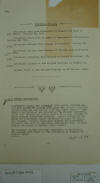
|
40. October 1932.
Excerpt from Guardia Newsletter,
with Last Minute Information on
contact at La Pelona, Oct. 28
with Umanzor group.
"P
E R S O N N E L ¶ Lieutenant
Bond from Chinandega to Managua
for duty in Law Office. October
22, 1932 ¶ Lieutenant Vogel from
Diriamba to Department of
Chinandega. October 22, 1932. ¶
Lieutenant Bilbrey from Managua
to Diriamba. October 22, 1932. ¶
Lieutenant Buckner from Managua
to Central Area on October 24,
1932. ¶ Lieutenant Rabberman
from Managua to Ocotal on
October 22, 1932. ¶ Lieutenant
Mahoney to 2nd Brigade Hospital
on October 22, 1932. ¶ Captain
Smith to 2nd Brigade Hospital on
22 October, 1932. ¶ T H E – E N
D ¶ LAST MINUTE INFORMATION: ¶
LIEUTENANTS BLANCO AND SOTOMAYOR
BOTH NATIVE OFFICERS AND
COMBINED PATROL OF GUARDIA
AUXILIARES AND CIVICOS TOTALLING
THIRTY EIGHT MEN HAD CONTACT
WITH WELL ARMED GROUP – JEFE
UMANZOR ESTIMATED AT 200 OR MORE
AT “LA PELONA” (128-264). FIGHT
VERY INTENSE AND LASTED FROM 6
TO 11 A.M. OCTOBER 28 UNTIL
GUARDIA AMMUNITION EXPENDED.
BANDIT CASUALTIES UNKNOWN BUT
LIEUTENANT BLANCO ESTIMATES AT
LEAST 50 KILLED AND WOUNDED.
GUARDIA CASUALTIES UNKNOWN BUT
LIEUTENANT SOTOMAYOR AND ABOUT
20 MEN STILL UNACCOUNTED FOR. NO
MORE DETAILS AVAILABLE AT
PRESENT TIME – 10329. ¶ The
MILITARY ACADEMY HAS BEEN
DISPATCHED TO CHICHIGALPA AND
CLEARED THAT POINT AT 0700
OCTOBER 29 IN PURSUIT OF UMANZOR
GROUP."
|
|
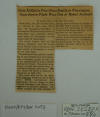
|
41. October 30,
1932. Press clipping: "Sixty Killed in
Five-Hour Battle in Nicaragua;
Guardsmen Fight Way Out of Rebel
Ambush,"
New York Times.
"Sixty
Killed in Five-Hour Battle in
Nicaragua; Guardsmen Fight Way
Out of Rebel Ambush ¶
By Tropical Radio to THE NEW
YORK TIMES. ¶ MANAGUA, Oct.
29.—At least sixty are believed
to have been killed when 100
insurgents ambushed a Nicaraguan
National Guard patrol of
thirty-eight men yesterday
fifteen miles north of
Chichigalpa in the Department of
Chinandega. ¶ The entire student
body of the Military Academy,
with its United States Marine
Corps instructors, has been
rushed to Chichigalpa to round
up the rebel band. ¶ The
National Guard patrol,
consisting of nine enlisted men
and twenty-nine volunteers,
fought its way out of the ambush
after a fierce combat lasting
five hours. The patrol is
reported to have lost twelve
men, including Lieutenant
Sotomayor. The toll among the
rebels is believed to have been
at least fifty. ¶ The rebels
were led by the chieftain
Umanzor, known as one of their
most daring commanders. The
guardsmen were in charge of
Lieutenants Sotomayor and
Blanco, both regarded as
excellent fighters. Recently a
policy has been adopted of
placing native officers in
charge of National Guard
patrols, in preparation for the
withdrawal of the last of the
United States Marines, which has
been set for February. ¶ The
recent recrudescence of rebel
activity in the Northern
provinces is attributed to a
desire to embarrass the
government on the eve of the
national elections, which are to
be held Nov. 6."
|
|
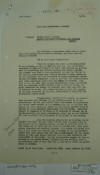
|
42. October 13,
1932. G-2 Report, "Sandino
Threatens Revolution When
Marines Depart," Major A. R.
Harris, Military Attaché, Costa
Rica, p. 1.
"G-2 Report. ¶ 2,700. ¶
NICARAGUA (Population & Social)
¶ Subject: Public Order &
Safety. ¶ Sandino Threatens
Revolution when Marines Depart.
¶ The following announcement
would seem to indicate that
Sandino has no idea of quitting
the field when the Marines
withdraw. ¶ “To my Nicaraguan
compatriots: ¶ “What the gringos
are after is the humiliation of
our country, as long as they are
with us. The conservative
candidacy of Díaz and Chamorro
is their work because the
yankees want an opportunity for
renewed dominion for yankee
friends. And because they find
it more convenient to give the
victory to the liberal
yanquistas, they ordered Moncada
to allow Sacasa to be the
candidate, and they pretended to
ignore Espinosa’s declarations
of yankee dominance. They do not
want any manifestations upon
their departure, which some are
trying to prevent. They even let
it be known that, should
difficulties occur, and should
they be requested, either
through Díaz or through Sacasa,
to again disembark and occupy
the country, even then they will
not be disposed to do so. The
reason for this is that the
campaign of the ARMY DEFENDING
THE NATIONAL SOVEREIGNTY OF
NICARAGUA has annihilated yankee
power. ¶ “Compatriots: Proceed
with dignity and remember than
[that] you have been victims, of
the yankees as well as of our
politicians. He who goes behind
these individuals and approaches
the ballot boxes watched by the
yankees WILL NOT DO ANYTHING BUT
RENDER THE MOST LAMENTABLE
HOMAGE TO THE FOREIGN BAYONET
WHICH IS CASTING ITS LAST
INSULTING REFLECTION OVER
NICARAGUA. Expecting dignity of
Chamorro or of Díaz, or of
Espinoza or Sacasa, is, my
fellow patriots, the worst
foolishness, above all as the
CONQUERING ARMY DEFENDING THE
SOVEREIGNTY OF NICARAGUA is
approaching. ¶ Tell the invading
admiral who is treating you as
cattle – GET OUT: Do your duty.
Do not obey a single order of
the marines in the election
farce. NO ONE IS OBLIGATED TO GO
TO THE POLLS, NOR IS THERE ANY
LAW WHICH SO COMPELS YOU. Make
yourselves deserving and
meriting liberty. Let people
affiliated with the Liberal
Party not believe that a triumph
of the conservative ticket will
last longer than the time
indispensable for its
liquidation by this same people
together with the ARMY DEFENDING
THE SOVEREIGNTY OF NICARAGUA.
Let the Conservative people not
fear a triumph of the Sacasa
ticket, because this has
hovering over it the punishing
hand of this army and it will
never enter the presidency in
January. ¶ From: M. A. Costa
Rica ¶ Report No. 1794 ¶ Date:
October 13, 1932. . . . "
|
|
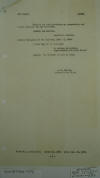
|
43. October 13,
1932.
G-2 Report, "Sandino Threatens
Revolution When Marines Depart,"
Major A. R. Harris, Military
Attaché, Costa Rica, p.
2.
"
. . . G-2 Report. ¶ 2,700 ¶
“This is the real situation, my
compatriots, and I have given
you the way to follow. ¶ Country
and Liberty. ¶ Augusto C.
Sandino. ¶ General encampment of
the Segovias, Sept. 15, 1932. ¶
A true copy of the original. ¶
N. Salinas de Aguilar, ¶
Representative in Costa Rica.” ¶
Source: “La Tribuna” of Oct. 8,
1932. ¶ A. R. Harris, ¶ Major,
G. S., M. A. ¶ From: M. A. Costa
Rica ¶ Report No. 1794 ¶ Date:
Oct. 13, 1932."
|
|
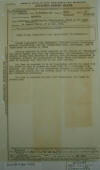
|
44. October 8, 1932.
Naval Intelligence Report on
Visit of Dr. Escolástico Lara
(Nicaraguan) to Honduras, Naval
Attaché, Tegucigalpa.
"Manuel
Balladares (See reference),
Fernando Larios, Nicaraguan
Sandino Sympathizers, and Dr.
Escolastico Lara, Nicaraguan,
came to Tegucigalpa on October
3, 1932. ¶ Nothing definite is
known relative to the mission of
Balladares and Larios except
that they are Sandinistas, and
Balladares has for several
months been desirous of getting
into political prominence in
Nicaragua, however the
association of these three
individuals would tend to
indicate that they are on the
same mission. ¶ Dr. Lara is
reported to be in Tegucigalpa
enroute to Danlí with the object
in view of proceeding from there
to a conference with Sandino.
The object of this conference
concerns a possible agreement
between Sandino and the Liberal
party of Nicaragua relative to
the forthcoming elections. Dr.
Lara is reported to have left
Tegucigalpa for Danlí on October
6th."
|
|
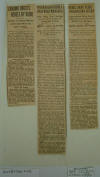
|
45. October 1932.
Press clippings. "Sandino
Directs Rebels By Radio —
Success in Evading Marines Laid
to Short-Wave Set Safe in
Jungles,"
Washington Star
(ca. 2 Oct). "Nicaraguan Rebels Raid Near
Managua — Sack Village, Burn
Buildings and Carry Off Number
of Women and Children — Capital
Fears Attack,"
New York
Times
(2 Oct). "Rebel Band Flees Nicaraguan
Guard — Looters Burned Voting
Records at San Francisco del
Carnicero, 20 Miles From
Managua,"
New York Times,
(3 Oct).
"SANDINO
DIRECTS REBELS BY RADIO ¶
Success in Evading Marines Laid
to Short-Wave Set Safe in
Jungles. ¶ (Copyright,
1932, by the Consolidated Press
Association.) ¶ A secret
short-wave radio system has
aided Gen. Augustino Sandino,
Nicaraguan revolutionist, in
evading capture by the United
States Marines and in his
ambushed attacks upon Marine
patrols in the jungles which
have taken a heavy toll during
the last five years, according
to private but authentic advices
received here yesterday. ¶ The
reports, from a former Sandino
aide now in Mexico City, state
that Sandino has been using
short-wave transmitters and
receivers in maintaining
contacts with his forces. This
system also is declared to have
been instrumental not only in
spotting Marine patrols, but in
smuggling arms, ammunition and
food supplies to the bandit and
his main contingent. ¶
Seems Basis for Success.
¶ Radio communication seems to
be the answer to Sandino’s
successful stand against the
Marines. In the jungle and
mountain fastnesses of Nicaragua
no other means of rapid
communication is possible. ¶
Sandino has managed to get
ammunition and food despite the
rigid embargoes enforced by the
government and the strenuous
efforts of the Marines, placed
in the country to maintain law
and order and to protect
American lives and property. ¶
Similarly, Sandino’s knowledge
at different times of the
whereabouts of Marine patrols
has caused no end of trouble.
His men, on dozens of occasions
since he began his banditry in
1927, have swooped down in
groups of Marines and Guardia
Nacionale [Nacional], the
official national guard of the
country. ¶ Details Are
Lacking. ¶ More than a
score of Marines have lost their
lives in the guerrilla warfare,
victims of snipers’ bullets.
Sandino’s losses, however, have
been far greater. ¶ Details of
the type of apparatus used by
Sandino are lacking. Engineers
believe it is improvised
short-wave equipment of low
power, which can be trundled
about. A short-wave station of
only a few watts, they said, can
transmit in code several hundred
miles during the night. ¶
NICARAGUAN REBELS RAID
NEAR MANAGUA ¶ Sack Village,
Burn Buildings and Carry Off
Number of Women and Children. ¶
CAPITAL FEARS AN ATTACK ¶ Bands
Reported Concentrating 15 Miles
Away—Guards Kill 31 and Wound
Many. ¶ Wireless to THE
NEW YORK TIMES. ¶ MANAGUA,
Nicaragua, Oct. 1.—Rebels sacked
the village of San Francisco del
Carnicero, twenty miles north of
Managua, this morning, burned
several public buildings and
carried off a number of women
and children, according to
reports to the National Guard
here. ¶ The inhabitants of
Managua are now in some fear
that the capital may be attacked
as a result of reports that the
rebels are concentrating at
Tipitapa, which is on a main
highway only fifteen miles from
Managua. This fear is increased
because the National Guard
garrison here is now depleted by
the sending of many men
throughout the country to
supervise the coming elections.
Military officials, however,
discount these fears. ¶ News of
the sacking of San Francisco del
Carnicero reached here several
hours afterward, because the
only means of communication is
by boat. A National Guard patrol
was sent out immediately to
pursue the band. The guard had
only two men in the village, as
that region has never been
molested before. ¶ An
unconfirmed reports says a large
cattle ranch north of Managua
belonging to former President
Emiliano Chamorro has been
looted. ¶ National Guard patrols
have had five encounters with
rebel bands in the last four
days, in which thirty-one rebels
have been killed and more than
thirty have been wounded. Two
guardsmen were reported killed
and three wounded, the wounded
including Lieutenant William A.
Lee, gun sergeant in the United
States Marine Corps, whose home
is at Ward Hill, Mass. ¶
Lieutenant Lee was slightly
wounded in the head. When the
patrol returns to Jinotega he
will be transferred to Managua
by airplane. ¶ The four
principal engagements were two
near Agua Carta, one near San
Antonio and one near Paso Real.
The fifth was in the mountains
near Chichigalpa. In the four
main encounters a guard patrol
led by Captain Louis P. Fuller
[Lewis B. Puller?] and
Lieutenant Lee clashed with 150
rebels well armed with machine
guns, hand grenades and other
weapons. ¶ Twenty-seven of the
150 were killed. Four others
were killed in the battle near
Chichigalpa, where the guards
were reported to have suffered
no casualties. ¶ The mountain
battle lasted an hour, after
which the rebels fled to a camp
in an extinct volcano. The guard
destroyed the camp, but the
rebels escaped. ¶ Before the
clash the rebels had attacked
and looted the plantation of
Alejandro Periera and others,
destroying valuable machinery. ¶
Tomorrow is the last day for
registration for the elections,
but there has been on [no]
interference so far by the
rebels, despite their threats
that they would prevent
registrations. ¶ REBEL
BAND FLEES NICARAGUAN GUARD ¶
Looters Burned Voting Records at
San Francisco del Carnicero, 20
Miles From Managua. ¶ MARINE
FLIERS WIN PRAISE ¶ Year’s
Record Shows 7,139 Hours Flown
With One Serious Crash—Fliers in
Nine Combats. ¶ By
Tropical Radio to THE NEW YORK
TIMES. ¶ MANAGUA, Oct. 2.—A
Nicaraguan National Guard patrol
sent to San Francisco del
Carnicero to pursue the rebels
who the day before had looted
stores and burned government
buildings, reported the rebel
had fled northward. Their
chieftain was recognized as Juan
Pablo Umanzor, one of Augusto
Sandino’s ablest generals, who
on many occasions has pounced
down upon unprotected
communities. ¶ The rebel group
consisted of 150 well-armed men,
who attacked the village, only
twenty miles from Managua, from
all sides, terrifying the
inhabitants. Telegraph and
telephone lines had been cut in
advance and the insurgents were
able to loot and burn the
village without interference.
The National Guard garrison of
four men escaped. ¶ After
committing their depredations
the rebels loaded their loot on
mules, destroying the
merchandise they were unable to
carry off. All election records,
including the voting lists, were
burned. ¶ The annual report of
Captain Francis P. Mulcahy,
commanding the United States
Marine Corps aviation squadron,
shows that 6,316 flights were
made during the past year,
including 1,816 photographic
reconnaissance, liaison and
combat flights. Marine corps
planes carried more than 650,000
pounds of freight, 4,532
passengers and soldiers and
$314,000 in cash to be dropped
at isolated places. ¶ The total
of hours flown were 7,139. There
was one serious crash, in which
two aviators were killed. ¶
There were nine aerial contacts
with rebels, during which
ninety-eight bombs were dropped
and 3,050 machine-gun rounds
were fired. Marine planes were
struck nineteen times by rebel
bullets. ¶ Twenty-five flights
were made to foreign countries,
usually on humane missions
connected with earthquakes,
hurricans [hurricanes] and
epidemics. ¶ The aviation
squadron consists of twenty
officers and 231
non-commissioned officers. Its
officers believe that,
considering the difficult
conditions, the mountainous
terrain and the few landing
fields, an unusual record was
established. Without the
services of the Marines’ planes
the Nicaraguan National Guard
would have been severely
handicapped."
|
|
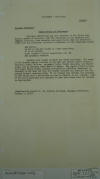
|
46. October 1, 1932.
Confidential G-2 Report on
Sandino Situation: Enemy
Supply and Equipment, Hq.
Guardia Nacional, Managua,
Nicaragua.
"NICARAGUA
– Political. ¶ 3020(d) ¶ Sandino
Situation. ¶ Enemy Supply and
Equipment. ¶ Reliable
information has been received to
the effect that Sandino agents
of Honduras, with the connivance
of the Honduran Government
officials, have recently
purchased stolen arms and
ammunition taken from the
government arsenals in Honduras,
to the following amount: ¶ 400
Rifles. ¶ 80,000 to 100,000
rounds of rifle ammunition. ¶ 20
to 50 pistols. ¶ 8,000 rounds of
pistol ammunition, cal. 45 ¶ Few
Automatic weapons. ¶ Sandino
paid 14,000 cordobas for these
munitions. The names of the
Sandino agents involved in the
deal are Alfonso Irias, Torribio
Tijerino, Camilo Guillen,
Alejandro Cerda, Manuel
Arguello, all Nicaraguans, and
an American named Edwin E.
Huber. The report further states
that Angel Zuniga Huete, Liberal
presidential candidate
(Honduras) is involved in the
deal and that the 14,000
cordobas are destined for the
Liberal Party’s campaign fund.
It is rumored that Sandino has
promised to help Huete with a
revolution in case he (Huete) is
not elected. Most of the above
munitions are reported to have
been taken from the Arsenal in
Tegucigalpa. ¶ (Confidential
report fr. Hq. Guardia Nacional,
Managua, Nicaragua, October 1,
1932.)"
|
|
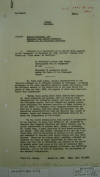
|
47. September 22,
1932. G-2 Translation of
article, "Sandino Will Refuse
his 'Visto Bueno' to Servility,"
El Excelsior (Sept 21),
Capt. Robert E. Cummings, Acting
Military Attaché, Mexico City,
p. 1.
"G-2 Report ¶ 3850-a ¶ MEXICO ¶
POLITICAL ¶ SUBJECT: Foreign
Relations, etc. ¶ Relations with
Foreign Countries; ¶ SANDINO and
the Nicaraguan Situation. ¶ 1.
Following is a translation of an
article which appeared in the
“Excelsior” of September 21,
1932, entitled “Sandino will
Refuse his ‘Visto Bueno’ to
Servility.” ¶ No Government
Arising from Yankee Surveillance
will be Recognized by him. ¶
Disavowal of Agreements signed
behind the Backs of the
Nicaraguan People. ¶ Dr. Pedro
José Zepeda, general
representative of the “Ejercito
Defensor de la Soberanía
Nacional de Nicaragua”, in
making statements to the press
regarding Sandino’s recent
activities, gives the following
account of the hostilities of
his army during the months of
June and July, 1932, the reports
of which have been heretofore
very fragmentary: ¶ “During
those months about forty combats
were engaged in, whose successes
and defeats, with the loyalty
which characterizes the
invincible leader, have been
made known to the Nicaraguan
people, that our laborer and
peasant masses might comprehend
the enormous sacrifice of blood
involved in the new effort to
reconquer their trampled
sovereignty and know how to
demand, with more energy and
decision, the corresponding
responsibilities from the
traitors who, headed by Moncada,
Sacasa and Chamorro, have
trafficked with the liberty and
independence of the nation. ¶
“In the latest communication
from Sandino’s headquarters in
Las Segovias, we learn that
column No. 12, commanded by
Generals Juan Gregorio Colindres
and Ismael Peralta, has received
instructions to proceed west,
taking as secretary, Dr. Arturo
Vega, a young physician of
well-known patriotism and
talent. This same column,
composed of 600 men and 9
machine guns, will be reinforced
by another of like strength and
commanded by Generals Juan
Santos Morales and Juan Pablo
Umanzor. These are the troops
which, combined, attacked and
captured the towns of Sauce
(Department of León) and Las
Lajas near the city of
Chinandega, and carried on the
series of combats which took
place on the 14th of September
when William Walker, the
North-American filibuster, was
definitely defeated,- and on the
15th of September, the
anniversary of our national
independence. ¶ From: M.A.
Mexico. ¶ Report No. 4162. ¶
Date: Sept. 22, 1932. . . . "
|
|
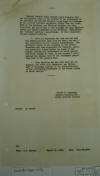
|
48. September 22,
1932. G-2 Translation of
article, "Sandino Will Refuse
his 'Visto Bueno' to Servility,"
El Excelsior (Sept 21),
Capt. Robert E. Cummings, Acting
Military Attaché, Mexico City,
p. 2.
" . . . General Augusto Cesár
Sandino again declares that the
nationalist cause of our country
is not interested in the
shameful and servile campaign
being waged in Nicaragua by the
several factions supporting
Adolfo Díaz for President of the
Republic, and Emiliano Chamorro
for Vice-President; and still
less in the campaign for Juan
Bautista Sacasa and Rodolfo
Espinosa of the so-called
‘Conservador’ and ‘Liberal’
parties, respectively. In this
connection General Sandino tells
me: ¶ “ ‘From the beginning our
Army has had only one object,
and will only have one until the
end, - the restoration of our
national independence. The
different phases of our struggle
do not matter. Therefore our
Army disregards the treaties,
pacts, and agreements signed
behind the backs of our people,
between the Governments of North
America and those imposed by
them, at the bayonet’s point,
against the express will of the
Nicaraguan people from 1909 to
the present date. ¶ “ ‘This
explains why our Army does not
recognize, nor never will
recognize, any Government of
Nicaragua imposed by the
super-vigilance of the
intervening Government of the
United States of North America.’
” . ¶ Robert E. Cummings, ¶
Captain, Infantry, DOL ¶ Acting
Military Attaché ¶ Source: As
stated. ¶ C/p ¶ From: M.A.
Mexico. ¶ Report No. 4162. ¶
Date: Sept. 22, 1932."
|
|
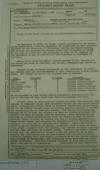
|
49. September 19, 1932.
Naval Intelligence Report on
Visit of the Naval Attaché to
the Honduran-Nicaraguan Border,"
Naval Attaché, Tegucigalpa, p.
1.
"On
September 3, 1932, the Naval
Attaché proceeded to the
Nicaraguan border with a view to
observing the conditions in that
vicinity relative to the
movements of Nicaraguan bandits
and bandit agents, and to view
the progress of General Plata
(new Comandante of Danlí) in his
work of preventing the smuggling
of arms to the bandits and the
rendering of aid to Sandino and
his followers by residents in
Honduras. ¶ During this visit
the Naval Attaché visited Danlí,
Paraiso and San Marcos de Colon
in Honduras, and Ocotal,
Totogalpa and Somoto in
Nicaragua. ¶ General Plata,
although designated as the
Comandante of Danlí, has control
over all subcomandantes in that
section and a small mobile
force. The number of men at his
disposal are as follows: ¶ Post
¶ Enlisted ¶ Officers ¶
Commander ¶ Danlí ¶ 18 ¶ 3 ¶
Colonel Marco Vaca ¶ Mobile
force ¶ 25 ¶ 1 ¶ Colonel Manuel
Espinal ¶ Las Manos ¶ 4 ¶ 1 ¶
Captain Reyes Mendez ¶ San
Marcos Colon ¶ 10 ¶ 1 ¶ Colonel
Pascual Montoya ¶ Cifuentes ¶ 4
¶ 1 ¶ Captain Jesus Martinez ¶
Paraiso ¶ 4 ¶ 1 ¶ Captain
Vicente Sanchez ¶ He is supposed
to have twenty police inspectors
operating with him but at the
time of this visit only four had
reported for duty. ¶ Plata’s
force is untrained and poorly
equipped, his armament
consisting of obsolete single
shot Remington rifles and two
Lewis machine guns. Although his
mobile force is actively
patrolling, it is doubtful if
his entire command could
accomplish anything should it
contact any sizeable group of
Sandino’s forces. The utmost
that Plata can accomplish is to
make the shipment of arms to
Sandino difficult and prevent
the sale of bandit loot in
Honduras. Some indications are
that he is working energetically
with the object in view of
accomplishing this. It would be
foolish for him to attempt
preventing a large bandit force
from crossing the frontier but
his presence discourages the
free use of Honduras as a
refuge. During the visit
information was received at
Ocotal, Nicaragua, that a group
of bandits, after a contact with
the Guardia, had started to
enter Honduras but had been
prevented by Plata’s force.
However, the Naval Attaché
doubts that the strength of
Plata’s force had anything to do
with keeping the Sandinistas out
but the bandits did not care to
offend Honduras, knowing well
that should residents along the
border become antagonistic or
unfriendly, free movements along
that section would become
difficult. They will however
continue to slip into Honduras
where they can do so unobserved.
¶ (Continued on Page Two-------
. . . "
|
|
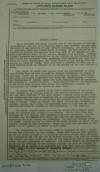
|
50. September 19, 1932.
Naval Intelligence Report on
Visit of the Naval Attaché to
the Honduran-Nicaraguan Border,"
Naval Attaché, Tegucigalpa,
p. 2.
"
. . . Plata informed the Naval
Attaché that he has several of
his men on espionage work and
that friendly people have
promised to keep him informed of
any movement of arms towards
Nicaragua. His mobile force is
operating along the border south
of Danlí. In this manner he is
hopeful of getting information
that will lead to the capture of
arms shipments should there be
any passing through that
section. Although Plata’s
interest was doubtful due to the
failure of the Government to pay
him or his officials their
salaries, that obstacle has been
overcome, at least temporarily,
and Plata is moving his family
from San Marcos de Colon to
Danlí. This will have a tendency
to keep him in that section
which is believed to be the
center of the most important
area. ¶ The people of Danlí seem
pleased with the appointment of
Plata and believe that he will
do much to prevent activities of
agents of Sandino. There was no
information available indicating
that there had been any recent
activities but Plata was
investigating a visit to
Tegucigalpa of Alfonso Irias and
Ramon Raudales whom he suspected
of engaging in Sandino business.
Plata stated that if his
suspicions prove to be true he
will have these two individuals
removed to Tegucigalpa and
forced to remain in that City. ¶
On August 20th, General Plata
held a conference at Las Manos
with Colonel T. E. Watson, Jefe
of the Guardia Nacional at
Ocotal, and the Jefe Politico of
the same place. General Plata
stated that the conference was
very successful and an agreement
had been reached for mutual
cooperation in preventing the
bandits from receiving aid from
Honduras. While in Ocotal, the
Naval Attaché was informed by
Colonel Watson, that Plata was
aparently [apparently] working
with him and forwarding
information helpful to the
functioning of the Guardia. ¶
The Naval Attaché spent two days
in Ocotal and returned overland
to Honduras via Totogalpa and
Somoto. During this time the
workings of the Guardia were
observed with much interest. The
efficiency and smoothness with
which the patrols and
organization functions is to be
highly complimented. The section
through which the Naval Attaché
passed is being effectively
covered in spite of the limited
number of men available. Every
facility was extended to the
Naval Attaché during his visit
to this area. ¶ The Comandante
in San Marcos Colon is supposed
to have a force of ten men
stationed in that place. There
were however none observed by
the Naval Attaché and a reliable
resident stated that actually
the Comandante had but two men
in active service. The section
around San Marcos was very quiet
and most of the residents were
working their farms and not
interested in Sandino. The
people cannot be considered
generally as friendly to nor
against Sandino but seem to
display no interest; it is
doubtful he receives aid thru
that part of Honduras."
|
United States National Archives, Record Group
165, Entry 77, Box 2653.
|
|
top of page |
|
|
